|
Jewish Holiday Calendar
Note: For site updates, please scroll past this entry....
In the summer there occurs a three week period of mourning that begins with the Fast of Tammuz and ends with Tishah B'Av. The last nine days of this three week period (i.e., from Av 1 until Av 9th) are days of increased mourning. However, after this somber time, the romantic holiday of Tu B'Av, the 15th of Av occurs. Summer ends with the 30 days of the month of Elul, a yearly season of teshuvah (repentance) that anticipates Rosh Hashanah and the fall holidays. The 30 days of Elul are combined with the first 10 days of the month of Tishri to create the Forty Days of Teshuvah that culminate with Yom Kippur.
The Summer Holidays:

Note that in accordance with Jewish tradition, all holiday dates begin at sundown:
- Month of Tammuz (begins Friday, June 7th, 2013)
- Month of Av (begins Sunday, July 7th, 2013)
- Month of Elul (begins Monday, August 5th, 2013)
June 2013 Updates
The Eyes of the Heart...

06.30.13 (Tammuz 22, 5773) The Hebrew word for "seeing" (ra'ah) is related to the word for "fear" (yirah), suggesting that when we really see life as it is, we will be filled with wonder and awe over the glory of it all. Every bush will be aflame with the Presence of God and the ground we walk upon shall suddenly be perceived as holy (Exod. 3:2-5). Nothing will seem small, trivial, or insignificant. It is in this sense that we are to serve the LORD with "fear and trembling" (φόβοv καὶ τρόμοv), that is, with an inner awareness of the sanctity and sacredness of life itself (Phil. 2:12-13). Da lifnei mi atah omed. Sin puts us to sleep, numbs our minds and hearts, and blinds us to the radiance of divine revelation. When we see life as it is, with the "eyes of the heart" (Eph. 1:18), we will be filled with wonder and awe over the glory of it all. "Fearing" (יִרְאָה) and "seeing" (רָאָה) will be linked and unified.
Open the eyes of my heart, O LORD...
Parashiyot Mattot-Masei (מטות־מסעי)
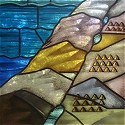
[ This week's Torah reading (Mattot - Masei) concludes the Book of Numbers. ]
06.30.13 (Tammuz 22, 5773) Last week's Torah portion (Pinchas) ended with a description of the central sacrifice required at the Tabernacle, namely, the daily sacrifice of a male lamb with unleavened bread and wine (i.e., korban tamid: קָרְבַּן תָּמִיד). This ongoing sacrifice portrayed the great Lamb of God, the offering of which represented God's "food," or what "feeds" His heart. In addition to this daily offering, additional sacrifices for Shabbat, the new moon, and the other festivals of the Jewish year were also specified...
This week's first Torah reading (Mattot) continues with the LORD giving laws regarding the making of vows (nedarim). After these various laws were defined, the Israelites were commanded to wage war against the Midianites for seducing the people to sin at the incident of "Baal Peor." During the ensuing battle, the wicked sorcerer Balaam was killed, as well as five tribal kings of the land of Midian. The portion ends with the tribes of Reuben, Gad, and half of the tribe of Manasseh settling east of the Jordan River, in the territories formerly occupied by the Amorite kings Sichon and Og.
The second Torah portion for this week (i.e., Masei) provides the boundaries of the land of Canaan that were to be initially occupied by the Israelites. Note that these borders are not the same as those described earlier to Abraham (see Gen. 15:18-21), since that area will be given to Israel only after the Messiah returns to establish Zion during the Millennial Kingdom (see Ezek. 47:15-48:35). During that time, Jerusalem will be the center of the earth and renamed Adonai Shammah (יְהוָה שָׁמָּה), "the LORD is there."
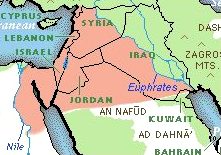
While the earlier promise that Israel would occupy 'from the Nile to the Euphrates' awaits its complete fulfillment, in this portion the description of the promised land is restricted to "the land of Canaan according to its borders" (Num. 34:2-13), that is, to the local region occupied by the seven Canaanite nations living there at the time of the conquest under Joshua.
Parashat Masei is traditionally read near the new moon of the month of Av, in anticipation of the nine days of mourning (for the lost Temple) that precede Tishah B'Av -- the saddest day of the Jewish calendar (the month of Av begins Sunday, July 7th, and Tishah B'Av occurs nine days later, on Monday, July 15th at sundown). The Mishnah states, "As [the month of] Av enters, we diminish joy," and the Gemara states, "All who mourn the destruction of Jerusalem will merit the celebration of her rebirth" (Ta'anit 30a). Mourning the loss of the Temple is appropriate until Messiah comes and restores it. Masei is read at this time to proclaim hope that soon Jerusalem will be rebuilt and the promises made to the Jewish people will be completely fulfilled.
Since the Book of Deuteronomy is mishneh Torah - a "retelling of Torah," it may be said that the Torah of Moses ends with these final portions, and by extension, with ongoing yearning for Zion. That is why we always read these portions during the Three Weeks of Sorrow, since we remember our present state of exile. And so it continues to this day as we await the return of our Messiah Yeshua to establish the Kingdom of God here on earth.
When someone dies, there is a grieving process you can go through that leads to closure. In Jewish tradition, this process involves the stages of shivah, sheloshim, and avelut - a full year of grieving over the loss of a loved one. If, however, it's uncertain that someone has in fact died, there is no end to mourning. We see this Jacob's life after his son Joseph suddenly disappeared: Jacob wasn't certain of his son's death, and therefore he mourned for years and years. He continued to mourn because he still held hope that his son lived. For this very reason do we both mourn and yet hold hope during the Three Weeks of Sorrow and Tishah B'Av. We mourn over the loss of what could have been, yet we hold hope in the restoration of Jerusalem, the "City of the Great King" (Psalm 48:2, Matt. 5:35) by the hand of Yeshua our Messiah. May that day come soon, and in our time. Amen.
Note: This week's Torah portion concludes Sefer Bamidbar, or the "Book of Numbers." Whenever we finish reading the book of the Torah, we traditionally recite three special words: Chazak, chazak, ve'nitchazek, meaning "be strong, be strong, and we will get stronger." You can download the "Table Talk" for each of these portions here:
The Call from Above...

06.28.13 (Tammuz 20, 5773) Have you heard the "upward call of God in Yeshua the Messiah" (Phil. 3:14)? This "upward call" (τῆς ἄνω κλήσεως) is the invitation from above, the sound of the heavenly Voice, beckoning you to enter the "high country" of the world to come. As Yeshua said, "I am from above (ἐγὼ ἐκ τῶν ἄνω)." Our true identity is not found in this world and its vain philosophy. The cross brings these things to an end, as we "cross over" from the realm of the dead to the realm of life (Gal. 6:14)... "Seek the things that are above (τὰ ἄνω ζητεῖτε) where the Messiah is seated at the right hand of God; focus your thoughts on the things above - not on things here on earth - for you have died, and your life has been hidden with Messiah in God. Then when the Messiah, who is your life, appears, you too will appear with him in glory" (Col. 3:1-4).
The great commandment is always Shema - listen - and heed God's Voice: "And your ears shall hear a word behind you, saying, "This is the way, walk in it," when you turn to the right or when you turn to the left (Isa. 30:21). At any given moment of our day, then, we can attune ourselves to hear the "upward call" and come "boldly before the Throne of Grace" (Heb. 4:16). The world knows nothing of this realm and is enslaved by appearances and the delusions of this realm, olam hazeh. As Yeshua said, "To you it has been given to know the mysteries of the kingdom of heaven, but to them it has not been given" (Matt. 13:11). The Spirit always says, "Come, my people, enter your chambers, and shut your doors behind you" (Isa. 26:20). The LORD beckons: "Call to me and I will answer you, and will tell you great and hidden things that you have not known" (Jer. 33:3). And I looked, and behold, a door standing open in heaven! And the first voice, which I had heard speaking to me like a trumpet, said, "Come up here, and I will show you great things..." (Rev 4:1).
"I have come home at last! This is my real country! I belong here. This is the land I have been looking for all my life, though I never knew it till now... Come further up, come further in!" - C.S. Lewis (The Last Battle)
Keeping Vigilant...

06.28.13 (Tammuz 20, 5773) Reading the news of this evil world turns my stomach and tempts me to walk in fear... Yeshua forewarned of the moral depravity that would pervade mankind just before the time of his return: "Because lawlessness (i.e., ἀνομία, from -α ('not') + νομος, 'torah') will be increased," he said, "the love of many will grow cold (i.e., ψύχομαι, 'be extinguished')" (Matt. 24:12). Note the link between Torah and love: true love requires respect for God's authority, for without that the divine image is disfigured and desecrated. People today do not respect God's authority; they cast off restraint and walk in the perversity of their own darkened hearts.... Likewise the Apostle Paul said the "End of Days" (אַחֲרִית הַיָּמִים) would be marked by "times of peril" (καιροὶ χαλεποί) because people would become increasingly narcissistic, self-absorbed, infatuated with their own self-importance, abusive toward others, disrespectful to elders, ungrateful, heartless, unforgiving, without self-control, brutal, treacherous, and so on (2 Tim. 3:1-4). When Paul said "times of peril," he used the same word (χαλεποί) that described the character of the demonaics mentioned in Matthew 8:28. Therefore, in light of the spiritual war that rages all around us, it is vital that we remain firmly rooted in what is real by taking hold of our identity and provision as children of God. "God has not given us the spirit of fear, but of power (גְּבוּרָה / δύναμις) and of love (ἀγάπη), and of a "sound mind" (σωφρονισμός), i.e., a "delivered" mind, "healed" from carnal fears (2 Tim. 1:7). We are not to be troubled like the world that lives in terror of man, nor are we to crave "security" from the vain devices of mere men (Jer. 17:5). No - we must look to God Almighty, the Master of the Universe. He alone is our Refuge and Defense, the One who gives us steadfast love in the midst of these storms.
"For you yourselves are fully aware (i.e., ἀκριβῶς οἴδατε, "you carefully know") that the Day of the LORD (יוֹם־יְהוָה) will come like a thief in the night" (see Matt. 24:42; 2 Pet. 3:10; Rev. 3:3; 16:15). While people are saying, "There is peace and security," then sudden destruction will come upon them as labor pains come upon a pregnant woman (i.e., the birthpangs of Mashiach: חֶבְלֵי מָשִׁיח), and they will not escape. But you are not in darkness, brothers, for that day to surprise you like a thief" (1 Thess. 5:2-4). Note that a characteristic of this season will be a emphasis on peace and "security," that is, setting up a ubiquitous security grid that will monitor people... In light of this, "let us not sleep, as others do, but let us keep awake and be sober.. having put on the breastplate of faith and love, and for a helmet the hope of salvation (ἐλπίδα σωτηρίας). For God has not destined us for wrath, but to obtain deliverance through our Lord Yeshua the Messiah" (1 Thess. 5:6-9).
True and False Zeal...

[ The following entry concerns this week's Torah reading, parashat Pinchas. Please read the Torah portion to "find your place" here. ]
06.27.13 (Tammuz 19, 5773) There are many people who are entirely sincere in their convictions, but they are sincerely wrong... In the time of the Second Temple, for instance, the Zealots despised the rule of Rome. Their political hatred caused them to blindly regard anyone who didn't share their passion as a personal enemy. In one of the great tragedies of Jewish history, these zealots actually killed more Jews than did the Romans themselves! And how many Christians these days "kill" relationships with other believers because of their particular zeal regarding some doctrinal question? I am not suggesting that doctrine is unimportant, but before you pick up that sword to do the business of Pinchas, you might do well to consider your heart's attitude...
We need to be careful with our passions. There is a "false zeal" that leads to estrangement and confusion. Withholding love from others is ultimately grounded in an appeal to God as the administrator of Justice. It is an appeal to God as Elohim (אֱלהִים), not as YHVH (יהוה), the Compassionate Source of Life. If we insist on our rights, we appeal to principles of justice, i.e., to God as the Lawgiver. But if we intend to have God be the Judge of others, we must appeal to Him to be our own Judge as well. If we have an unforgiving spirit toward others, we will not be forgiven (Matt. 6:15); if we are judgmental toward them, we ourselves will be put on trial; if we are cruel and ungiving toward them, we will experience life as hellish, miserable and mean. This reciprocal principle of Kingdom life appears throughout Jesus' teaching. According to your faith, be it done unto you (Matt. 9:29).
Note: For more on this important topic, see "Parashat Pinchas: God's Greater Zeal."
Righteousness of God...
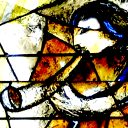
06.27.13 (Tammuz 19, 5773) "For many walk (πολλοὶ γὰρ περιπατοῦσιν) ... as the enemies of the cross of Messiah (τοὺς ἐχθροὺς τοῦ σταυροῦ τοῦ χριστοῦ)." Paul's statement is directed to those who profess faith in Yeshua. Those who minimize the need for the cross invariably stress the importance of "religion," of good works, and even of the supposed virtue of faith... The cross, however, scandalizes the aspirations of human pride by presenting the righteousness of God (צִדְקַת אֱלהִים), not the righteousness of men. The message of deliverance is not about how good you are, but about how good God is. Test yourself: In what are you trusting for eternal life? Salvation is "of the LORD," which means that it is His work done for the glory of the Name above all Names. As Jonah the prophet testified: "Those who cling to empty vanities forsake their own mercy..."
מְשַׁמְּרִים הַבְלֵי־שָׁוְא חַסְדָּם יַעֲזבוּ
וַאֲנִי בְּקוֹל תּוֹדָה אֶזְבְּחָה־לָּךְ
אֲשֶׁר נָדַרְתִּי אֲשַׁלֵּמָה יְשׁוּעָתָה לַיהוָה
me·sha·me·rim · hav·lei · shav' · chas·dam · ya·a·zo·vu
va·a·ni · be·kol · to·dah · ez·be·chah-lakh
a·sher · ne·dar·ti · a·sha·lei·mah · ye·shu·a·tah · la·do·nai

"Those who cling to empty vanities forsake their own mercy;
but I with the voice of thanksgiving will sacrifice to you;
what I have vowed I will pay: Salvation belongs to the LORD!"
(Jonah 2:8-9)

Like Jonah we first must be "swallowed up" in consciousness of our own rebellion before we realize we are undone, that we are without remedy apart from God's direct intervention and deliverance. We start there - in the "belly of the fish" - and later are resurrected to go forth by God's mercy and grace. Likewise we first see ourselves as undone and go to the cross, finding pardon and given the power of the ruach HaKodesh to live unto God according to the truth. But note that the imperatives of the New Testament are directed to the new nature given to us by God, and not to the old nature that has been crucified and done away. We are admonished to live in accordance with the truth of what God has done for us through the Moshia', the Savior. You are a new creation, therefore be who you are in the Messiah!
Thus says the LORD: "Cursed is the man who trusts in man and makes flesh his strength, whose heart turns away from the LORD. He is like a shrub in the desert, and shall not see any good come. He shall dwell in the parched places of the wilderness, in an uninhabited salt land. Blessed is the man who trusts in the LORD, whose trust is the LORD. He is like a tree planted by water, that sends out its roots by the stream, and does not fear when heat comes, for its leaves remain green, and is not anxious in the year of drought, for it does not cease to bear fruit" (Jer. 17:5-8).
"Not everyone who says to me, 'Lord, Lord,' will enter the kingdom of heaven, but the one who does the will of my Father who is in heaven" (Matt. 7:21). And what is the will of the Father but to trust in Messiah for life (John 6:40)? "What must we do, to be doing the works of God?" Yeshua answers: "This is the work of God, that you believe in the One whom he has sent" (John 6:28-29). The Torah of God centers on Messiah. On that day many will say to me, 'Lord, Lord, did we not ... do many mighty works in your name?' And then will I say to them, 'I never knew you; depart from me, you workers of lawlessness' (Matt. 7:22-23). From this we see that works - even those done in the name of Messiah - are insufficient for life, and that something more is needed. And how you understand what that "something more" is makes all the difference....
Perfected Strength...

06.27.13 (Tammuz 19, 5773) "Have you not known? Have you not heard? The Eternal One, the LORD, is the Creator of the ends of the earth (בּוֹרֵא קְצוֹת הָאָרֶץ). He does not faint nor grow weary; his understanding is unsearchable. He gives power to the faint, and to him who has no might he increases strength" (Isa. 40:28-29). Human reason has no objection that God can impart strength, but it objects that strength is found in those who are broken and weary – that is, to those mortally wounded in the battle against evil. The principle of the self-life, the ego, religious observance, "doing the law," etc., is a spiritual dead-end. The word is this: God gives strength to the weary, to the faint, to those who are without potency or power. But this means that we first must be emptied, broken, and stripped of our self-sufficiency before the strength of God is manifest in us: "My power is made perfect (τελειοῦται) in weakness" (2 Cor. 12:9). God's way is first to break us, to make us weaker and weaker, so that he can then fill us with the miraculous divine nature. Like all sacrifices that were brought to the altar, we must pass through death to life by means of our union with the Messiah at the cross... It is only after the cross that it may be said, "It is no longer 'I' who lives; now it is Messiah who lives His life in me." There is indeed strength, power, and victory – but such comes after the cross, after we reckon carnal energy as useless. Not by might, nor by power, but by My Spirit, says Adonai Tzeva'ot.
נתֵן לַיָּעֵף כּחַ
וּלְאֵין אוֹנִים עָצְמָה יַרְבֶּה
no·tein · la·ya·ef · ko·ach
u·le·ein · o·nim · otz·mah · yar·beh

"He gives power to the faint,
and to him who has no might he increases strength"
(Isa. 40:29)
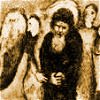
Where we read, "Messiah who loved me and gave himself for me" (Gal. 2:20), we emphasize the object of God's redeeming love; we stress that this word is being spoken to "me," and that Messiah's love is poured out "for me." But how can we justify doing so, in light of the innumerable souls that have been brought forth in the world? The Mishnah asks, "Why was man created alone?" and answers so that each person must say the world was created for me. "Whoever destroys a soul, it is considered as if he destroyed an entire world; and whoever saves a soul, it is considered as if he saved an entire world..."
The Very First Word...
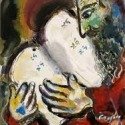
06.26.13 (Tammuz 18, 5773) Do you see how the very first of the Ten Commandments, namely, the mitzvah to accept and receive the LORD as your God (Exod. 20:2), implies faith in everlasting life and resurrection from the dead? When the LORD says, Anokhi Adonai Elohekha (אָנכִי יְהוָה אֱלהֶיךָ) - "I AM the LORD your God" - he invites you to join the life that He Himself lives, that is, Eternal Life... He is the "Living God" (אֱלהִים חַיִּים), the Source and LORD of all Life. And just like the other Ten Commandments, this one is spoken in the second person singular: I AM the LORD of you (singular). When you hear "I AM the LORD your God" as personally spoken to you, then you are made a child of eternal promise, and even should heaven and earth melt away in fervent heat, you keep faith that nothing can separate you from the care and love of your heavenly Father (Rom. 8:31-39).
The Ten Commandments may be summarized this way: 1) "I am your only Deliverer, the One who loves and personally choses you; 2) love me exclusively; 3) regard my love as sacred; 4) keep trusting in me; 5) honor your life and its history. Do no harm to others: 6) forsake your anger, 7) abandon your lust, 8) renounce your greed, and 9) abhor all lying. Finally, 10) refuse to envy others or to compare yourself with them... Know that you belong to me and that you are entirely accepted. Love others as you are also loved."
He Gives Greater Grace...

06.26.13 (Tammuz 18, 5773) "For though the LORD is exalted, He regards the lowly, but the haughty He knows from afar" (Psalm 138:6). Yea, God opposes the proud but gives grace to the humble (James 4:6). And who are the humble but those keenly aware of their own nothingness - the despised, the needy, and the rejected of men? The LORD justifies the ungodly by faith; He hears their cry for deliverance "from the depths"; he creates them anew yesh me'ayin, "out of nothingness," by making them into a "new creation" (בְּרִיאָה חֲדָשָׁה) through the agency and power of the Holy Spirit (Rom. 4:17; 2 Cor. 5:17). O praise Adonai Oseinu, the LORD God our Maker, for he looks upon the lowly, he is near to nishberei lev, the brokenhearted, and he binds up their wounds...
כִּי־רָם יְהוָה וְשָׁפָל יִרְאֶה
וְגָבהַּ מִמֶּרְחָק יְיֵדָע
kee · rahm · Adonai · ve·sha·fahl · yeer·eh
ve·ga·vo'·ha · mee·mer·chak · ye·yei·da

"For though the LORD is exalted, He regards the lowly,
but the haughty He knows from afar."
(Psalm 138:6)

Hebrew Study Card
Again, just as the LORD made the world yesh me'ayin, "out of nothing," so His creative power continues unchanged. God is able to take a dead heart, a heart of stone, and make it tender and soft through the breath of His Spirit... Therefore His eyes look upon the lowly, the humble, the poor in spirit, but He disregards those who lift themselves up in pride.
Indeed, the LORD resists the proud and repays their scorn with scorn: "With the scorners he is scornful, but to the lowly he gives grace" (Prov. 3:34). Those who mock the idea of sin and arrogantly exalt themselves will be held in derision, but of those who find grace it is written, "Blessed is the man who walks not in the counsel of the wicked, nor stands in the way of sinners, nor sits in the seat of scoffers, but his delight is in the Torah of the LORD, and in His Torah he meditates day and night" (Psalm 1:1-2). Indeed it is a severe mercy, a weighty grace, that is bestowed to us, friends...
אִם־לַלֵּצִים הוּא־יָלִיץ
וְלַעֲנָוִים יִתֶּן־חֵן
eem - la·lei·tzeem · hoo - ya·leetz
ve·la·a·na·veem · yee·ten · chen

"With the scorners He is scornful;
but to the lowly he gives grace."
(Prov. 3:34)
When Yeshua quoted of the Haftarah from the prophet Isaiah in the synagogue, saying: "The Spirit of the Lord GOD is upon me (רוּחַ אֲדנָי יְהוִה עָלָי), because the LORD has anointed me (מָשַׁח יְהוָה אתִי) to bring good news to the humble (לְבַשֵּׂר עֲנָוִים); he has sent me to bind up the brokenhearted (לַחֲבשׁ לְנִשְׁבְּרֵי־לֵב), to proclaim to the captives, liberty (לִשְׁבוּיִם דְּרוֹר), and to the bound ones, release from their chains; to proclaim the time of the LORD's favor" (Isa 61:1-2a; see Luke 4:12-13), he did not continue reading the passage to include the "Day of the Vengeance of our God" (i.e., the time of the Great Tribulation, or Yom Adonai) nor the Day of Zion's Comfort (i.e., the time of the final redemption and the establishment of the Messianic kingdom). Messiah's first advent as ben Yosef is to save and extend the time of grace; after this comes the second advent as ben David, when the judgment of the nations takes place and the King of God rules over the earth. The Day of the LORD draws near, friends. May God help us be ready...
Hunger of the Heart...
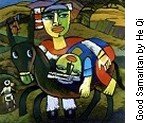
[ The following entry concerns this week's Torah reading, parashat Pinchas. Please read the Torah portion to "find your place" here. ]
06.26.13 (Tammuz 18, 5773) As I've discussed elsewhere on the site, the great revelation of the Torah at Sinai focused on the giving of the mizb'each (altar) to Israel. However -- as our Torah portion this week makes clear-- the central sacrifice upon this altar was the daily sacrifice (i.e., korban tamid: קָרְבַּן תָּמִיד) of a defect-free male lamb offered with shemen (oil) matzah (unleavened bread) and wine. The LORD calls this "My offering, My bread..." (see Num. 28:1-8). In other words, the service and ministry of the Mishkan (i.e., Tabernacle) constantly foreshadowed the coming Lamb of God who would be offered upon the altar "made without hands" to secure our eternal redemption (Heb. 9:11-12).
The sacrifice of the Lamb represents "God's food," a pleasing aroma, for it most satisfied the hunger of His heart (Eph. 5:2). Indeed, the obedience of Yeshua to the death upon the cross represents God's hunger for atonement, or "at-one-ment," since it restored what was lost to Him through sin, namely, fellowship with human beings. God could never be satisfied until He was able to let love and truth be reconciled:
חֶסֶד־וֶאֱמֶת נִפְגָּשׁוּ צֶדֶק וְשָׁלוֹם נָשָׁקוּ
che·sed ve·e·met nif·ga·shu, tze·dek ve·sha·lom na·sha·ku

"Love and truth have met, justice and peace have kissed"
(Psalm 85:10)

Download Study Card
Sometimes we say that we "hunger for God," but it is vital to remember that it is God who first hungers for us. God desires our love and fellowship. He comes to seek fruit among the trees - but does He find any? He walks in the cool of the day, calling out to us, but are we attuned to hear His voice? Do we accept the invitation to be in His Presence? When God "knocks on the door of your heart" to commune with you, what "food" will you be serving? (Rev. 3:20). Every day we are given an opportunity to "feed God" through expressing faith, hope, and love. Ultimately it is our obedience to the truth is what "feeds" Him: "Behold, to obey is better than sacrifice, and to hearken than the fat of rams" (1 Sam. 15:22).
Note: For more on this subject, see "The Hunger of the Heart."
Prayer for this hour...

06.25.13 (Tammuz 17, 5773) Many of us are hurting, Lord, and we sometimes feel alone in our struggle... This world seems so senseless, so brutal, and so evil at times; we feel powerless, overwhelmed, and even sick inside... We look to You, O God, and for your mercy and power. Help us to accept what we cannot change and to completely trust in Your great healing, despite the sickness of the world around us. Remind us that though we cannot change the world, we are given grace to sustain our trust in You, our glorious and merciful Healer. And may we never be ashamed; may we never grow bitter; may our sorrows lead us from strength to strength. And may this time of testing lead us to greater wisdom, to compassion, and finally back to You. Amen.
The Chofetz Chaim once said, "With faith there are no questions; without faith, there are no answers," which is to say that trusting in God's love ultimately gives rest to our relentless questions, whereas no amount of answers will ever suffice the heart that refuses to trust. Having faith doesn't mean pretending to have all the answers, of course, but it affirms – even in the absence of understanding, in dark moments, in the midst of sorrow or pain – that hope is real, love is what matters most, and that God will never, ever fail us...
Note: Today is the 17th of Tammuz - a date that marks the start of the "Three Weeks of Sorrow" leading up to the tragic holiday of Tishah B'Av. Click here for more information.
Reading with Breath...
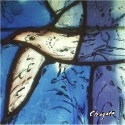
06.25.13 (Tammuz 17, 5773) The question has been asked why the Torah was written without vowels, punctuation marks, and so on. The lack of vowels implies that we must bring breath (i.e., ruach, spirit) to our reading of the words; the lack of punctuation implies that we must be humble and rely on others to help us read with understanding. In other words, we must bring the "sighs" of our heart to the text and be open-minded to receive revelation.
 |
We need the power of the Holy Spirit to read correctly, and the Holy Spirit reveals the Living Word and glory of Yeshua: "It is the Spirit who gives life; the flesh is no help at all. The words that I have spoken to you are spirit and life" (John 6:63).
Note: The ancient Greek New Testament manuscripts did not use capital letters, punctuation, or "chapter and verse" numbers, though they did include vowel letters as part of the Koine Greek alphabet. Nevertheless, the same lesson applies as well: we need the Holy Spirit and humility to read the texts correctly...
Yeshua the Living Torah

06.25.13 (Tammuz 17, 5773) Yeshua is the Living Torah (תּוֹרַת חַיִּים) and its spiritual Light (Prov. 6:23), for through Him we are able to see (John 8:12). The numeric value of the word "lights" (i.e., אורות) is 613, the traditional number of commandments enumerated in the written Torah. Yeshua is the inner light and meaning of all that the written Torah says; indeed, He is the goal (i.e., τέλος, "purpose" or "reason") of all that the Torah teaches and the means of attaining righteousness for all who trust in Him (Rom. 10:4).
Obedience to God is its own reward, since we are given more light as we obey: "If you know these things, happy are you if you do them" (John 13:17). Interestingly, the Hebrew word for "darkness" (i.e., choshekh: חשֶׁךְ) uses the same letters to spell both the verb "to cringe" (i.e., kachash: כָּחַשׁ) and the verb "to forget" (i.e., shakhach: שָׁכַח). Indeed Yeshua warned us, "Not everyone who says to me, 'Lord, Lord,' will enter the kingdom of heaven, but the one who does the will of my Father who is in heaven. On that day many will say to me, 'Lord, Lord, did we not prophesy in your name, and cast out demons in your name, and do many mighty works in your name?' And then will I declare to them, 'I never knew you; depart from me, you workers of lawlessness" (Matt. 7:21-23). This is why we say, "Blessed are You, LORD our God... who sanctifies us with His commandments..." The giving of the commandments is a gift that enables us to walk in the righteousness of life (1 John 2:29). We don't "have to" do the commandments of God, but what a happiness it is to do so!
כִּי נֵר מִצְוָה וְתוֹרָה אוֹר
וְדֶרֶךְ חַיִּים תּוֹכְחוֹת מוּסָר
ki ner mitz·vah, ve'to·rah ohr,
ve·de·rekh cha·yim to·che·khot mu·sar

"For the commandment is a lamp, and the Torah is light,
and the reproofs of discipline are the way of life" (Prov. 6:23)

Download Study Card
It is clear from Scripture that while we are not saved by means of law-keeping, we are not excused from doing acts of righteousness. God did not "waste His breath" revealing the principles of righteousness to the Jewish people, and therefore we are to "study to show ourselves approved unto God" (2 Tim. 2:15). The "law of the Spirit of life in Yeshua" (תּוֹרַת רוּחַ הַחַיִּים בְּיֵשׁוּעַ) empowers to serve God according to a new principle of freedom. After all, true freedom doesn't mean doing "whatever you want," but rather means the power to choose contrary to the demands of your lower nature. We "put off" the old self and "put on" the new (Eph. 4:22-24). It is the divinely imparted "new nature" that gives us the power to "put to death" the old self by reckoning it crucified with Messiah (Gal. 2:19-20). Obedience to the Torah of Yeshua leads to further revelation, just as disobedience to it leads to further darkness (Matt. 13:12). Yeshua is only the "Author of Eternal Salvation" for those who heed and obey Him (Heb. 5:9). "If we live by the Spirit, let us also walk by the Spirit" (Gal. 5:25).
L'Shem Shamayim...
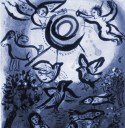
06.25.13 (Tammuz 17, 5773) "And when the other disciples heard [that James and John sought prominence], they were indignant" (Mark 10:41). But why were they aggrieved except that they sought the glory for themselves? The faults we see in others usually mirror our own... If your brother offends you, test your own heart to see where you share his fault... Or do you seek reward for your service to God alone? Do you request a "chief seat" at His table? Any "reward" in the truest sense must include empathy and service for the benefit of others. Heavenly rewards are never gained through self-promotion but through losing yourself in the father's business (Luke 17:10). We don't make old wine from new... What good is any "reward," after all, if it were gained at the expense of your brother or sister? Is such praiseworthy? We can only look past ourselves and see others when we understand that we are in as much need of God's mercy as they are... It is natural enough to want a blessing, but check your heart: the Apostle Paul was willing to himself be accursed for the sake of the well-being and blessing of his own brothers (Rom. 9:3).
Pinchas and Isaac...
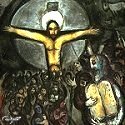
[ The following entry concerns this week's Torah reading, parashat Pinchas. Please read the Torah portion to "find your place" here. ]
06.24.13 (Tammuz 16, 5773) The name "Phinehas" (i.e., Pinchas: פִּינְחָס) shares the same numeric value (gematria) as the name "Isaac" (i.e., Yitzchak: יִצְחָק), which suggests that just as Isaac was willing to be sacrificed in obedience to God (i.e., during the Akedah), so Pinchas was willing to die for his zeal. Note further that Pinchas' passion turned away the wrath of God and established a covenant of an "eternal priesthood" (כְּהֻנַּת עוֹלָם), a phrase that shares the letter value as the word be'acharit (בְּאַחֲרִית), a term that means at the "end of days" (Gen. 49:1; 1 John 2:18). To string this together, we see a connection between Isaac and Pinchas, both of whom picture Yeshua our Messiah. Isaac is a picture of the Lamb of God, of course, and Pinchas pictures the zeal that grafts the heart into the everlasting priesthood of God. The Hebrew gematria reveals that the priesthood of Yeshua that brings everlasting peace is the "end of days" priesthood for humanity, and there is no other. Just as Pinchas was "grafted in" to the priesthood of Israel, so those who belong to Messiah are the "grafted in" priesthood for the end of days, chaverim...
כִּי־קִנְאַת בֵּיתְךָ אֲכָלָתְנִי
וְחֶרְפּוֹת חוֹרְפֶיךָ נָפְלוּ עָלָי
ki · ki·nat · be·te·kha ·a·cha·la·tni
ve·cher·pot · cho·re·fe·kha · na·fe·lu · a·lai

"For zeal for your house has consumed me,
and the reproaches of those who reproach you have fallen on me.
(Psalm 69:9)

Parashat Pinchas - פינחס
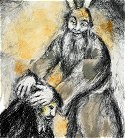
[ The following entry concerns this week's Torah reading, parashat Pinchas. Please read the Torah portion to "find your place" here. ]
06.24.13 (Tammuz 16, 5773) Last week's Torah portion (Balak) concerned the evil King Balak and the wicked prophet Balaam, but this week's portion is about the heroic zeal of Pinchas (Phinehas), the late-born grandson of Aaron the priest, to whom the LORD awarded a brit kehunat olam (בְּרִית כְּהֻנַּת עוֹלָם), a "covenant of a perpetual priesthood." As I hope you will see, Pinchas pictures the Messiah Yeshua, and the covenant of priesthood given to him is a picture of the greater priesthood after the order of Malki-Tzedek.
Jewish tradition says that when Aaron and his sons were commissioned as the exclusive priests of Israel (Exod. 40:12-15), the office applied only to themselves and their future descendants. Since Aaron's grandson Pinchas had already been born at the time the promise was given, however, he did not automatically receive this honor, especially since his father Eleazar (the son of Aaron) was married to an "outsider" -- namely, the daughter of Yitro (also called Putiel, Exod. 6:25). This explains Rashi's statement that the other tribes mocked Pinchas. How dare this "son of an outsider" kill a nassi (prince) of Israel (i.e., Zimri), especially since Pinchas' mother was regarded as an idol worshipper! The LORD honored Pinchas' zeal, however, and overruled the tribalism of the Israelites, and he was therefore elevated to be a priest with special honor before the LORD.
God looks at the heart, chaverim, and is able to make those who have zeal for Him true priests of the LORD! You don't have to be born Jewish to impress the LORD God of Israel, since He's "no respecter of persons" (Rom. 2:11). Not only can He create spiritual children of Abraham from the stones of the ground (Matt. 3:9; Luke 3:8), but He can turn someone considered a non-Jew (by the rabbis, anyway) into a highly honored priest of Israel (1 Pet. 2:9-10). Indeed, many descendants of Pinchas later became the most faithful of the High Priests of Israel during the First Temple period.
Note that according to one midrash, when Zimri and Cozbi (the Midianite princess) were cavorting, they actually ran inside the Tabernacle compound itself, directly past Moses and the people who were weeping at its entrance (Num. 25:6)! Pinchas then took a spear from the Tabernacle guards and followed after them. When he caught up with them within the Tent of Meeting itself, he pierced them through (Num. 25:7-8). After this, thousands of men from the tribe of Simeon ran in after him, seeking to kill him. Pinchas was in such a state of terror that "his soul left him" and the souls of Nadav and Abihu (Aaron's deceased sons) entered his body -- and by this means he became a Kohen.
Parashat Pinchas (like parashat Emor in Leviticus) also includes mention of all of the (sacrifices of the) mo'edim (holidays) given to Israel (Num. 28). These include the daily (tamid), weekly (Shabbat), monthly (Rosh Chodesh) sacrifices, as well as the sacrifices assigned to the special holidays: Passover, Shavuot, Rosh Hoshannah (Terumah), Yom Kippur, Sukkot and Shemini Atzeret. Remembering the joys of the Temple and the special celebrations of the Jewish people are thought to add a contrast to the otherwise somber time of reflection during the Three Weeks of Sorrow.
The Star Still Leads...

[ The following entry concerns this week's Torah reading, parashat Balak. Please read the Torah portion to "find your place" here. ]
06.21.13 (Tammuz 13, 5773) "There shall come a star out of Jacob..." Amazingly, Balaam – who may have been the forebear of the "magi of the east" (Matt. 2:1-2) – foresaw the coming of the Messiah: "I see him, but not now; I behold him, but not near: a star shall come out of Jacob (כּוֹכָב מִיַּעֲקב), and a scepter shall rise out of Israel" (Num. 24:17). Balaam's prophecy described the coming of the Messiah and his reign in two distinct aspects: "A star from Jacob shall lead the way (i.e., דָּרַךְ)," this refers to Messiah's first coming as the way of life (John 14:6), "and a scepter shall ascend (וְקָם שֵׁבֶט) from Israel," this refers to Messiah's second coming to establish the kingdom after the final redemption. Here is the Hebrew prophecy for you to hear:
אֶרְאֶנּוּ וְלא עַתָּה
אֲשׁוּרֶנּוּ וְלא קָרוֹב
דָּרַךְ כּוֹכָב מִיַּעֲקב
וְקָם שֵׁבֶט מִיִּשְׂרָאֵל
er·e·nu · ve·lo · at·tah
a·shu·re·nu · ve·lo · ka·rov
da·rakh · ko·khav · mi·ya·a·kov
ve·kam · she·vet · mi·yis·ra·el

"I see him, but not now;
I behold him, but not near:
a Star shall come out of Jacob,
and a Scepter shall rise out of Israel"
(Num. 24:17)

The story of Balaam took place "out of view" of the Israelites, which teaches us that the LORD our God is always at work - even among our enemies - for our blessing and ultimate good... No weapon formed against God's people shall prosper, and every tongue that speaks in judgment shall be made to stammer out praise. "He who vindicates us is near; who will contend with us?" Indeed, "who shall bring any charge against God's elect? It is God who justifies. Who is to condemn? Yeshua the Messiah is the one who died -- more than that, who was raised -- who is at the right hand of God, who indeed is interceding for us" (Rom. 8:33-34). Those of faith understand history - including the End of Days - as the expression of God's sovereign and providential hand. The gracious Savior always works "all things together for the good" of those who are trusting in Him.
Keep pressing on by faith, trusting in God's protection and care for you... Shabbat Shalom!
Abiding in Him...

06.21.13 (Tammuz 13, 5773) Yeshua used the allegory of a vine and its branches to illustrate how we are to be spiritually connected to Him: "I am the true Vine, and you are the branches," he said (John 15:1-6). The purpose of the branch is to be a conduit of the life of the vine. We derive our identity, life and strength from being made part of Yeshua's life, His vision, and His purposes... In Hebrew, this idea is called devakut (דְּבָקוּת) which means "cleaving" to God bekhol-levavkha (בְּכָל־לְבָבְךָ), "with all your heart," and bekhol-nafshekha (בְּכָל־נַפְשְׁךָ), "with all your soul," and bekhol-me'odekha (בְּכָל־מְאדֶךָ), "with all your being..." Cleaving to God is the essence of the great commandment to love the Lord given in the Shema. We are able to so cleave to God in Yeshua because God does a miracle and gives us lev chadash, a new heart to serve Him. We love Him because He first loved us (1 John 4:19). Whether Yeshua is living in you (and you are living in Him) is the most important question of your life upon which everything else ultimately depends. He appeals to each heart of faith: "Live in me, and I will live in you" (John 15:4).
The Shout of the King...

[ In our Torah portion this week (Balak), we read how Balaam intended to curse the Israelites, but God "took hold of his tongue" and made him bless the people instead... ]
06.21.13 (Tammuz 13, 5773) In his second oracle delivered from the summit of Pisgah (Num. 23:18-24), Balaam reaffirmed that the LORD would never revoke his blessing from Israel ("God is not a man that he should lie...") and went on to say that "God has not perceived iniquity in Jacob nor toil in Israel: the LORD his God is with him (יְהוָה אֱלהָיו עִמּוֹ), and the shout of a King is in him" (Num. 23:21). The sages say that phrase "the shout of a king" (תְּרוּעַת מֶלֶךְ) can also be translated as "the breaking of a king," referring to king Messiah who would break the nations (תְּרעֵם) with a rod of iron (Psalm 2:9). However, the "breaking" of King Messiah would first be offered for the iniquities of the people (John 4:22) and then would come the final breaking of the nations at the time of the final redemption. In a sense, Israel "carried" the Lamb of God from Egypt...
Plastic Words and Covetousness
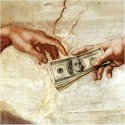
[ The following entry concerns this week's Torah reading, parashat Balak. Please read the Torah portion to "find your place" here. ]
06.20.13 (Tammuz 12, 5773) A common characteristic of false teachers (like Balaam) is that they are inwardly covetous, though they carefully cloak themselves as godly and pious... Of such the Apostle Peter says, "in their greed they will exploit you with 'plastic words' (πλαστοῖς λόγοις) to make merchandise out of you" (2 Pet. 2:3). This suggests they "mold" their speech to exploit (or to suit) their listeners, plastering over what they really believe, and using words with elastic meaning to deceive others... Such teachers therefore appeal to the flesh, to human pride, by scratching the "itch" people have to feel superior toward others, and therefore they often find their audience among the insecure, the weak, and the vulnerable... Because they are covetous - always wanting more – they invariably seek positions of power, authority, fame, and of course they crave wealth to fund their "entitled" lifestyle. Peter says such false teachers make "merchandise" out of you, that is, they regard you as a commodity, an article of exchange, a coin in their pocket... They are not really there for you, though they appeal to you to be there for them, or for the sake of the "little children" or some other cause they will exploit for their advantage.
"Beware of false prophets," Jesus warned, "who come to you in sheep's clothing (literally, "the skins of sheep," ἐν ἐνδύμασι προβάτων), but who inwardly are ravenous wolves. You will recognize them by their fruits" (Matt. 7:15; cp. 2 Pet. 2:1). However, because they come in disguise, pretending to be "children of light," we must be all the more vigilant. On the one hand, we must beware of those who "wrap themselves in a tallit" (legalists) and teach that we should come under the yoke of the law (Matt. 23:15), and on the other hand, we must beware those who deny or minimize words of the holy Torah, and who falsely claim that the way to heaven is "broad," and that we therefore have licence to walk after the desires of our own hearts (antinomianists). We must use discernment, chaverim. The LORD allows false teachers in our midst to test our hearts: "For there must be factions among you in order that those who are genuine among you may be recognized" (1 Cor. 11:19). Therefore we must "test the spirits" to see if they are "of God," that is, whether they focus on the righteousness of God given exclusively through Yeshua, the "narrow way that leads to life" - or whether they focus on something else. The Ruach HaKodesh always centers the heart on the glory of God revealed in Yeshua (John 16:14; 1 Cor. 2:2, etc.).
The Doctrine of Balaam...
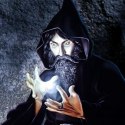
[ The following entry concerns this week's Torah reading, parashat Balak. Please read the Torah portion to "find your place" here. ]
06.20.13 (Tammuz 12, 5773) The "doctrine of Balaam" (ἡ διδαχή Βαλαάμ) is the wicked strategy of enticing others to sin by encouraging them to "eat food offered to idols" and to engage in sexual immorality (Rev. 2:14). This was how Balaam was able finally to curse the Israelites at Baal Peor, after all (see Num. 25:1-10; 31:16). In short, Balaam's doctrine was one of "syncretism," advocating a mindless "tolerance" that arrogantly claimed that all religions are equally true, and therefore all are equally false... Such "tolerance" is a charade for moral and spiritual nihilism that lends itself well to political fascism. In ancient Rome, official "tolerance" led to the brutal intolerance of the "Imperial Cult" where the power of the State (represented by the Emperor) was worshiped. In our age, the doctrine of Balaam first entices people to "eat food offered to idols," that is, to partake of the irrational dogma of "absolute tolerance" and unthinking universalism. After opening the heart to accept such idolatry, sexual immorality is the natural expression, a consequence of debasing doctrinal promiscuity. God sets us free from the slavery of surrounding culture to become a witness of the truth. Assimilating with this world and its political ideals is spiritual adultery. Do not fool yourself: Whoever makes himself a friend of the world is an enemy of God (James 4:4).
With the world system as it now is, I wonder how close we are to the appearance of the prophesied "Man of Sin," the Messiah of Evil who is to come... Surely the Greek and Roman Emperors who deified themselves prefigured his coming.
All-Pervasive Glory...

06.19.13 (Tammuz 11, 5773) Look at the sky often, for it is the "daily bread of the eyes." We can see something of the awesome mystery of God's eternal power by considering the vast expanse of the cosmos that surrounds us all: "The heavens tell the story of the glory of God, and the sky above proclaims the work of his hands; Day after day it speaks out; night after night it reveals His greatness" (Psalm 19:1-2).
הַשָּׁמַיִם מְסַפְּרִים כְּבוֹד־אֵל
וּמַעֲשֵׂה יָדָיו מַגִּיד הָרָקִיעַ
יוֹם לְיוֹם יַבִּיעַ אמֶר
וְלַיְלָה לְּלַיְלָה יְחַוֶּה־דָּעַת
ha-sha·ma·yim · me·sa·pe·rim · ke·vod · El,
u·ma·a·seh · ya·dav · mag·gid · ha·ra·ki·a;
yom · le·yom · ya·bi·a · o·mer,
ve·lai·la · le·lai·la · ye·cha·veh · da·at

"The heavens recount the glory of God,
and the sky above proclaims the work of His hands.
Day after day it speaks out;
night after night it reveals His greatness."
(Psalm 19:1-2)

Download Study Card
A sense of wonder and mystery is central to faith, since "the last step of human reason is the confession that there are an infinite number of things that are beyond it" (Pascal). Just as human reason ultimately points beyond itself, so faith points beyond itself to the Lord as the Source and the End of all mystery, beauty, goodness, love, and truth... The idea of mystery is not a confession of ignorance as much as it is an awareness of the inherent sanctity of life and of the ultimate triumph of love.... Faith believes that everything will ultimately be healed by God's overarching will, through which the universe is sustained and made intelligible to us. Therefore, Da lifnei mi attah omed: "Know before whom you stand!" We are constantly surrounded by an ongoing procession of the glory of God (Isa. 6:3). May the Lord our God help us open our eyes to see...
The Sacred Name of God...
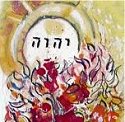
06.19.13 (Tammuz 11, 5773) God's Name means "Amen" and "faithfulness." The "Name above all other names" is Yeshua, the embodiment of God's great attributes of chesed (love) and tzedek (justice). In the cross of Yeshua is fulfilled the prophecy: "Love and truth meet; righteousness and peace have kissed" (Psalm 85:10), and at the cross God is revealed as both "just and the justifier" of the ungodly who trust in Messiah for righteousness (Rom. 3:25). God first revealed the meaning of His Name to Moses after the sin of the Golden Calf, when Israel was in a state of brokenness and teshuvah: YHVH (יהוה) means "merciful and gracious, longsuffering, and abundant in love and truth" (Exod. 34:6). Where it says, "you have made great upon all your Name your Word" (Psalm 138:2), we see that Yeshua the Messiah, the Utterance and the Breath of God made flesh, is the highest revelation of the Name of God (Phil. 2:9-11, Isa. 45:23).
אֶשְׁתַּחֲוֶה אֶל־הֵיכַל קָדְשְׁךָ
וְאוֹדֶה אֶת־שְׁמֶךָ
עַל־חַסְדְּךָ וְעַל־אֲמִתֶּךָ
כִּי־הִגְדַּלְתָּ עַל־כָּל־שִׁמְךָ אִמְרָתֶךָ
esh·ta·cha·veh · el · hei·khal · kod·she·kha
ve·o·deh · et · she·me·kha
al · chas·de·kha · ve·al · a·mi·te·kha
ki · hig·dal·ta · al · kol · shim·kha · im·ra·te·kha

"I bow down toward your holy temple
and give thanks to your Name
for your love and your truth,
for you have made great upon all your name your Word."
(Psalm 138:2)

In this verse note that the "holy temple" (הֵיכַל) refers to the Mishkan, not the Temple in Jerusalem, since it had not yet been built, and therefore it rightly refers to the Divine Presence that dwells among man, i.e., to the Messiah himself (John 1:1;14). God first revealed the meaning of His Name to Moses after the sin of the Golden Calf, when Israel was in a state of brokenness and teshuvah: God's Name YHVH (יהוה) means "merciful and gracious, longsuffering, and abundant in love and truth" (Exod. 34:6). Where it says, "you have made great upon all your Name your Word," we see that the greatness of Messiah, the Utterance and Breath of God made flesh, the highest revelation of the Name of God.
The relationship between a name (i.e., shem: שׁם) and a thing (i.e., davar: דּבר) is of fundamental importance in the Jewish thought. In the Hebraic mindset, naming and being are linked together to form a unity. The name of something represents its essence, power, and purposes. The Name of the LORD, for instance, stands for God's character and reputation demonstrated by his saving acts and merciful deeds. Regarding the revelation of the Faithful Word of God it is written, "This Yeshua (יֵשׁוּעַ) is the stone that was rejected by you, the builders, which has become the cornerstone (i.e., rosh pinnah: ראשׁ פִּנָּה). There is salvation (i.e., yeshuah: יְשׁוּעָה) in no one else, for there is no other name (אֵין שֵׁם אַחֵר) under heaven given among men by which we must be saved" (Acts 4:11-12).
Reviewing the Message...

06.19.13 (Tammuz 11, 5773) Where it is written, "I have been crucified with Messiah: It is no longer 'I" who live, but Messiah who lives in me," we understand this "I" to be the self identified under the covenant of the law, separate from Messiah, and subject to the principle of self-justification. This "I" apart from God no longer lives, but rather a new identity, a new "I" is made alive by trusting in Yeshua, "who loved me and gave himself for me" (Gal. 2:20). "For I through the law died to the law (ἐγὼ γὰρ διὰ νόμου νόμῳ ἀπέθανον) so I might live to God" (Gal. 2:19). We have a new "identity" through our union with Messiah, we are "new creations," and our lives are now forever bound up in His invincible life. We no longer look to ourselves, but to the miracle of "Messiah who lives in me." We walk in righteousness by yielding to the abiding righteousness of Yeshua in our daily lives...
It is always good to review the message of the gospel.... Man's way is to attempt to reform his nature, to strive to follow the law, to resist the impulse to lust and sin, to create "good karma," and so on, whereas God's way is not to make us stronger and stronger, but rather to make us weaker and weaker - by crucifying the old nature. Messiah "in me" abolishes the law (understood as the principle of self-justification), condemns sin in the flesh (by dying on the cross), and kills the power of death itself (by means of his resurrection)...
Like all sacrifices that were brought to the altar, we must pass through death to life by means of our union with the Messiah at the cross... It is only after the cross that it may be said, "It is no longer 'I' who lives; now it is Messiah who lives His life in me." Yeshua didn't die a painful and bloody death on the cross to save sinful flesh but rather to become sinful flesh in exchange for the sinner who trusts in Him (2 Cor. 5:21). That's the essence of the gospel (εὐαγγέλιον), the power of God's salvation. On some mysterious level, the exchange of our sin with Messiah's righteousness is "ontological," meaning that it has real being, energy, and reality. Therefore we do not attempt to crucify ourselves, but instead accept that we already have been crucified by the agency of the Spirit of God.
Consider the miracle of God's great love for you: "He who did not spare his own Son but gave him up for us all, how will he not also with him graciously give us (χαρίζομαι) all things?" (Rom. 8:32). Therefore by faith in God's indomitable love, "let the peace of God (שְׁלוֹם הָאֱלהִים) rule in your hearts" (Col. 3:15).
Note: Please remember that "Torah" (תּוֹרָה) does not mean "law..." Followers of the Jewish Messiah love the Torah and will always honor its message...
The Enigma of Balaam...

06.19.13 (Tammuz 11, 5773) What are we to make of the enigmatic character of Balaam? Was he a prophet or a puppet of God? Nehama Leibowitz (1906-97) notes two essential differences between Balaam and the Hebrew prophets. First, Balaam sought special visitations and visions, building altars and performing rituals to "force" the prophetic spirit. The Hebrew prophets, on the other hand, never engaged in these sorts of activities to hear from the LORD, and many were reluctant messengers, convinced of their own nothingness. Second, the Hebrew prophets cautiously spoke in the name of the LORD ("thus saith the LORD...") to authenticate their message, but Balaam took credit for his visions, flamboyantly describing himself as a great "seer" with special powers. Based on Joshua 13:22 (which describes him as a sorcerer), it is likely that Balaam was given a temporary gift of prophecy, perhaps like the "witch of Endor" was allowed to temporarily communicate with the dead (1 Sam. 28:7-20). In other words, God raised up Balaam to demonstrate his authority over the powers of darkness and to reassure Israel of God's ongoing protection of his people....
In the New Testament, Balaam is regarded as one who desired to corrupt others for his own personal gain. The Apostle Peter does not call him the "son of Beor" but "son of Bosor" (τοῦ Βοσόρ), a play on the Hebrew word basar (בָּשָׂר), the flesh, implying that he was a "son of carnality" who enticed of Israel to sin at Baal Pe'or (see 2 Pet. 2:15; Num. 31:16). Peter further described him as a spiritual hireling who loved the "wages of unrighteousness" (μισθὸν ἀδικίας ἠγάπησεν), and who was willing to sell his spiritual "services" without regard for the truth (Num. 22:7, Deut. 23:4-5, 2 Pet. 2:15). He knew he should not prophecy about Israel, but he so loved the prospect of reward and the flattery of men that he justified his venture into darkness. "An evil eye, a haughty spirit, and a lusting soul - these are signs of disciples of the wicked Balaam" (Avot 5:22). For more on this topic, see "The Way of Balaam" in the parashah summary links.
Note: The Hebrew word melekh (מֶלֶךְ) means "king" and shares the same letter value as the word lemech (לֶמֶךְ), a name that means "powerful," but can also mean "fool." The sages reasoned that since the letter Mem represents the brain (מוֹחַ) or thought (מַחֲשָׁבָה), and the letters Lamed-Kaf refers to the kidneys (כליות), a king is one who uses right thinking to rule the heart (מ-לך), but a fool reverses the order and makes thinking a servant of the passions and the lower nature... Therefore Balaam was properly regarded as a fool.
He is Faithful and True...

[ The following entry concerns this week's Torah reading, parashat Balak. Please read the Torah portion to "find your place" here. ]
06.18.13 (Tammuz 10, 5773) It is encouraging to understand that despite the repeated failures of the Israelites in the desert, the LORD never let go of his people... Indeed, as the story of Balaam reveals, if a spiritual enemy would secretly arise to curse Israel, God would take the sorcerer "by the tongue" to evoke God's blessing instead (Deut. 23:4-5). As Balaam himself attested: "there is no sorcery (i.e., nachash: נַחַשׁ) against Jacob, no divination (i.e, kesem: קֶסֶם) against Israel" (Num. 23:23). Unlike scheming Balaam, who was willing to say whatever people wanted to gain temporal reward, God is "not a man that he should lie, nor a son of man, that he should change his mind" (Num. 23:19). What the LORD has promised he will invincibly perform: His word is full of integrity and truth: "The grass withers, the flower fades, but the word of our God will stand forever" (Isa. 40:8). The God of Israel is forever faithful in his love, and no one can overrule his desire (Num. 23:20; Rom. 11:29).
לא אִישׁ אֵל וִיכַזֵּב
וּבֶן־אָדָם וְיִתְנֶחָם
הַהוּא אָמַר וְלא יַעֲשֶׂה
וְדִבֶּר וְלא יְקִימֶנָּה
lo · ish · el · vi·kha·zev
u·ven · a·dam · ve·nit·ne·cham
ha·hu · a·mar · ve·lo · ya·a·seh
ve·dib·ber · ve·lo · ye·kim·me·nah

"God is not man, that he should lie,
nor a son of man, that he should change his mind.
Has he said, and will he not do it?
Or has he spoken, and will he not fulfill it?"
(Num. 23:19)

Download Study Card
Ein od milvado: There is no real power apart from God. As Yeshua said, "Behold, I give to you authority over sorceries (i.e., nechashim: נְחָשִׁים) and scorpions, and over all the power of the enemy, and nothing shall hurt you" (Luke 10:19).
Blessing of Inner Peace...
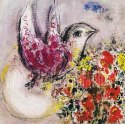
[ In our Torah portion this week (Balak), we read how Balaam intended to curse the Israelites, but God "took hold of his tongue" and made him bless the people instead... ]
06.18.13 (Tammuz 10, 5773) It is remarkable that the traditional morning blessing recited at synagogues around the world begins with words attributed to Balaam, the enigmatic and self-styled prophet: Mah Tovu: "How lovely are your tents, O Jacob; your dwelling places, O Israel!" (Num. 24:5). The sages say that the word "tent" (אהֶל) refers to the inner life – how we really feel inside – whereas the word "dwelling" (מִשְׁכָּן) refers to the outer life - our place or circumstances. Together, the inner and the outer mark the quality of our lives, but the inner is the starting point, since we must first learn to live in peace with ourselves. This is vital: we must first tolerate our shortcomings and practice compassion toward our frail humanity... This is sometimes called shalom ba'bayit, "peace in the home" (of the self). Such inner peace is the greatest of blessings, since without it we will cling to pain, fear, and anger, thereby making us unable to find our place at the table in God's kingdom of love.
מַה־טּבוּ אהָלֶיךָ יַעֲקב
מִשְׁכְּנתֶיךָ יִשְׂרָאֵל
mah · to·vu · o·ha·le·kha · Ya·a·kov
mish·ke·no·te·kha · Yis·ra·el

"How lovely are your tents, O Jacob,
your dwellings, O Israel"
(Num. 24:5)

Note: For more on this, see the Mah Tovu Blessing pages.
Blessing of the Good Eye...

06.17.13 (Tammuz 9, 5773) "The one who utters a blessing is blessed; the one who utters a curse is cursed" (Ruth Rabbah). This does not mean that we walk about blessing others in a formulaic (i.e., insincere) way as much as it expresses the great truth that as we are within, so we are without: as we forgive, so we are forgiven; as we give, so we receive... But we can't give to others what we have not received, and that means first of all learning to see how we are loved by God, despite ourselves. We must use ayin tovah, the "good eye" for the sake of our own inner peace. We must extend to ourselves "good will" and compassion before we can offer it to others. If you can't yet love yourself, ask the Lord to help you begin by not hating yourself, by turning away from the fear that hides behind your anger. As Rashi wisely said, "hatred causes a person to forget his identity."
Curses turned to Blessings...
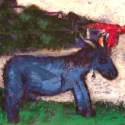
[ In our Torah portion this week (Balak), we read how Balaam intended to curse the Israelites, but God "took hold of his tongue" and made him bless the people instead... ]
06.17.13 (Tammuz 9, 5773) God can turn curses into blessings... For example, Joseph was blessed despite the ill-will of his brothers: "You devised evil against me, but God devised it for good" (Gen. 50:20). Note that the same Hebrew verb (חשׁב) is used to describe both the evil intent of the brothers and the good intent of the Lord. This teaches us that God overrules the malice of men to effect his own good purposes, and therefore we can rightfully affirm gam zu l'tovah (גַּם זוּ לְטוֹבָה), "this too is for good" (Rom. 8:28). Underlying the surface appearance of life (chayei sha'ah) is a deeper reality (chayei olam) that is ultimately real, abiding, and designed for God's redemptive love to be fully expressed. Resist the temptation, therefore, to judge by mere appearances. Forbid your troubles to darken the eye of faith. Do not unjustly judge God's purposes or try to understand His ways. As the story of Balaam shows, God makes even the wrath of man praise Him (Psalm 76:10). "Then God opened Balaam's eyes, and he saw the Angel of the LORD (מַלְאַךְ יְהוָה) standing in the way, with his drawn sword in his hand. And he bowed down..." (Num. 22:31). Indeed, every knee will bow to the LORD our God and Savior (Isa. 45:22-23; Phil. 2:10-11).
פְּנוּ־אֵלַי וְהִוָּשְׁעוּ כָּל־אַפְסֵי־אָרֶץ
כִּי אֲנִי־אֵל וְאֵין עוֹד
בִּי נִשְׁבַּעְתִּי יָצָא מִפִּי צְדָקָה
דָּבָר וְלא יָשׁוּב
כִּי־לִי תִּכְרַע כָּל־בֶּרֶךְ תִּשָּׁבַע כָּל־לָשׁוֹן
pe·nu · e·lai · ve·hiv·va·she·u ·kol ·af·sei ·a·retz
ki · a·ni · El · ve·ein · od
bi · nish·ba·ti · ya·tza · mi·pi · tze·da·kah
da·var · ve·lo · ya·shuv
ki · li · tikh·ra · kol · be·rekh · ti·sha·va · kol · la·shon

"Turn to me and be saved, all the ends of the earth!
For I am God, and there is no other.
By myself I have sworn; from my mouth has gone out in righteousness
a word that shall not return:
"To me every knee shall bow, every tongue shall swear allegiance"
(Isa. 45:22-23)

We find comfort that the schemes of the wicked are subject to the sovereign purposes of the LORD our God. Ein od milvado (אֵין עוֹד מִלְבַדּו) - there is no power that can be exercised apart from God's consent and overarching will... Indeed all authority on heaven and earth belongs to Yeshua, the "the Ruler of the Kings of the earth" (עֶלְיוֹן לְמַלְכֵי־אָרֶץ). As it is written, "All the nations you have made shall come and worship before you, O Lord, and shall glorify your name" (Psalm 86:9).
Parashat Balak - פרשת בלק

[ The following entry concerns this week's Torah reading, parashat Balak. Please read the Torah portion to "find your place" here. ]
06.16.13 (Tammuz 8, 5773) This week's Torah portion (Balak) is named after an evil Moabite king (בָּלָק) who sought to curse the Jews by enlisting the help of an Midianite "seer" named Balaam (בִּלְעָם). King Balak's plan was to use occult powers and magic against the Israelites before they reached the Promised Land. Similar to the delicious irony that befell the villain Haman in the Book of Esther, King Balak's scheme was upended, and the curse he sought to put on the Jewish people was repeatedly pronounced as a blessing by the prophet Balaam instead. An exasperated Balak finally dismissed the prophet from his service, but before departing from the dejected king, Balaam ironically prophesied the destruction of the Moabites and the victory of God's people.
But who was this mysterious prophet named Balaam? According to Jewish tradition, Jacob's wicked uncle Laban had a son named Beor (בְּעוֹר), who became the father of Balaam. In other words, the "cursing prophet" Balaam was none other than the grandson of Laban:
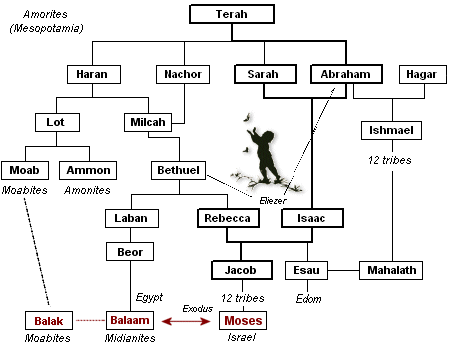 |
Note that the name "Beor" first appears in connection with a king of Edom (Gen. 36:32), which suggests that Balaam might have once been a king of the Edomites (i.e., the descendants of Esau). Further note the phonetic similarity to Peor. If Beor and Peor are the same, then Balaam was actually a prophet of Baal Peor, a local Semitic god.
Balaam was regarded as a great seer, magician and an adept in the occult. He had an "evil eye" and drew the spirit of demons to anything he gazed upon (Avot 5:22). His notoriety made him famous, and powerful people asked him to invoke curses on their enemies. The Talmud (Sanhedrin 106a) states that Balaam became so famous as a magician that he later became a chief advisor to Pharaoh. It was Balaam who advised the new Pharaoh to enslave the Israelites and to afflict them with brutal taskmasters (Exod. 1:8-11). For more information about the identity of Balaam, see the entry entitled, "The Curses of Balaam."
Beauty for Ashes...

[ The following entry concerns this week's Torah reading, parashat Chukat. Please read the Torah portion to "find your place" here. ]
06.14.13 (Tammuz 6, 5773) The ashes of the red heifer represented the death and sacrifice of something extremely rare, valuable, and precious. The ashes were mixed with "living water" (מַיִם חַיִּים) to reveal the truth that though the end of all flesh is but dust and ashes, the Spirit gives cleansing and life. Indeed the word ashes (אֵפֶר) may be rearranged to spell both cure (רַפֵא) and beauty (פְאֵר). The author of the book of Hebrews argues from the lesser to the greater: If the sprinkling of water mixed with the ashes of a red heifer purify the flesh from contamination with physical death, how much more does the blood of Messiah purify the soul from the deeds that cause spiritual death? (Heb. 9:13-14). Indeed, because of Yeshua's sacrifice we are given "beauty for ashes, the oil of joy for mourning, the garment of praise for the spirit of heaviness," that we may be called oaks of righteousness, the planting of the LORD, that He may be glorified (Isa. 61:3). Shabbat Shalom!
Note: Please remember this ministry in your prayers, and especially for John, who deals with chronic pain issues. Thank you...
Blessing of Yearning...

06.14.13 (Tammuz 6, 5773) In the busyness of the day, in anxious murmurings of the heart, Lord, I have missed you... in my haste, I have lost sight of you; I have heeded voices of fear; I have sought after my own way... Dear LORD God, leave me not, neither forsake me - despite my wandering, despite the ambivalence of my soul, for "whom have I in heaven but you," and to whom shall I turn for life in this world? I have no good apart from You... Help me escape the vanity and deceit of my own heart; help me to focus on what is real. Let not this day be lost to triviality; let it not be marked by unuttered prayer or lost passion for heaven. "As a deer longs for streams of water, so my soul longs for you, O God. I thirst for God, for the living God. When shall I come and appear before God?" (Psalm 42:1-2). Grant me this blessed hunger and thirst for you; impart holy desperation and longing for you alone; turn my heart to seek you bekhol levavkha, with all my heart...
כְּאַיָּל תַּעֲרג עַל־אֲפִיקֵי־מָיִם
כֵּן נַפְשִׁי תַעֲרג אֵלֶיךָ אֱלהִים
צָמְאָה נַפְשִׁי לֵאלהִים לְאֵל חָי
מָתַי אָבוֹא וְאֵרָאֶה פְּנֵי אֱלהִים
ke·a·yal · ta·a·rog · al-af·kei · ma·yim
ken · naf·shi · ta·a·rog · e·le·kha · e·lo·him
tza·me·ah · naf·shi · le·lo·him · le·el · chai
ma·tai · a·vo · ve·e·ra·eh · pe·nei · e·lo·him

"As a deer longs for streams of water,
so my soul longs for you, O God.
I thirst for God, for the living God.
"When will I be able to go and appear in God's presence?"
(Psalm 42:1-2)

As I've said before, God's people are always "strangers" in this world; they are literally "e-stranged" -- living here, yet not here. We are outsiders and pilgrims, not at home in this world, and our faith therefore is both a type of "protest" against any interpretation of reality that excludes, suppresses, denies, or minimizes the Divine Presence as well as a longing for the place where we truly belong.... If you feel crazy in an insane situation, then you are really quite sane... The world will feel oppressive and strange once you have been awakened from its madness and refuse to be moved by the delusions of the crowd... Life in olam hazeh (this world) is a place of poignant passing that leads to the world to come. Our faith affirms that underlying the surface appearance of life is a deeper reality that is ultimately real and abiding. It "sees what is invisible" (2 Cor. 4:18) and understands (i.e., accepts) that the "present form of this world is passing away" (1 Cor. 7:31).
"Blessed art Thou, LORD our God, who never leaves nor forsakes us, and who draws us close through hunger and thirst." We are truly blessed when we ache with heartfelt longing for the Divine Presence... Feeling content, cocksure, satisfied, numb, etc., is a sign of a dreadful condition of heart. "You, God, are my God, earnestly I seek you; I thirst for you, my whole being longs for you, in a dry and parched land where there is no water" (Psalm 63:1).
"Now to the One who is able to keep you from falling, and to cause you to stand, rejoicing, without blemish before His glorious presence, to the only God our Savior through Yeshua the Messiah, our Lord and great Lamb of God, be glory, majesty, power, and authority, before all time, and now, and for all eternity. Amen." Shabbat Shalom and may you be filled with all the fullness of God's love in our beloved Savior and LORD.
Cleansing from Death...
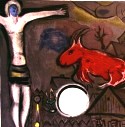
[ The following entry concerns this week's Torah reading, parashat Chukat, though the mysterious themes of purity and impurity are first described in parashat Tzav... ]
06.14.13 (Tammuz 6, 5773) Contact with the dead causes spiritual impurity (i.e., tumah) because death, as the separation from life, is the ultimate expression and consequence of sin. People routinely deny the meaning of death, explaining it away as the result of some cause from which one might escape ("he worked too hard," "she got sick," "it was an accident," etc.). People rationalize death because they refuse to see it as the effect of sin, the consequence of the original transgression of Adam and Eve that humanity as a whole has "inherited" (Gen. 2:17; 3:19; Rom. 5:12). Therefore the Torah states that the birth of a child results in impurity (Lev. 12:2,7). Full atonement comes from "digging up the root of sin" by being purified from its source, namely, the metaphysical curse of death itself. The Red Heifer alludes to the sin of the Golden Calf, which finds its source in the original idolatry of Adam and Eve. Even the blood of the sacrifice was burned to ash "outside the camp," putting a complete end to the "life of death" and its power to corrupt. The Red Heifer is therefore a special sort of "sin offering" (chatat) that cleanses from contact with death itself (Num. 19:9).
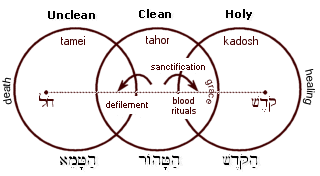 |
Note: The "fall" of man implies that we have contact with death - both inwardly and outwardly. The sacrifice of Yeshua as our "Red Heifer" cleanses us from all tumah and lovingly makes us clean (tahor) before the Father. The "water and the blood" is part of the "olah sacrifice" of Yeshua for our redemption and purification before God offered at Calvary (John 19:34, 1 John 5:6). The water and blood flowing from His wounds are the means by which we are purified from sin and death... All this comes from the love (chesed) of God given in our Messiah and Savior. Just as the sacrifice of the Red Heifer cleansed from the effects of physical death, so the sacrifice of Yeshua cleanses us from the effects of spiritual death. For more on this subject, see the "Gospel of the Red Cow."
Blessing for Darkness...

06.13.13 (Tammuz 5, 5773) "If I say, surely darkness covers me ... the night shines as the day; nothing hides from your radiance" (Psalm 139:11-12). We have to trust that God is in our darkness, in the silence, in the unknown... You come out of the shadows when you admit that you act just like other people, that you are human, in need of reconciliation yourself... Above all you need God. You need help. You need a miracle to help you to truly love. You may find excuses for many things, but you cannot escape the "wretched man that I am" reality that is grounded in your fears. God sees in the darkness and is present there, too. When you feel alone, like an unbridgeable gulf lay between you and all that is good; when you feel like you want to scream but are afraid that even then no one would hear, may the LORD shine His light upon you...
גַּם־חשֶׁךְ לא־יַחְשִׁיךְ מִמֶּךָ
וְלַיְלָה כַּיּוֹם יָאִיר
כַּחֲשֵׁיכָה כָּאוֹרָה
gam · cho·shekh · lo · yach·shikh · mi·me·ka
ve·lai·lah · ka·yom · ya·ir
ka·cha·she·khah · ka·o·rah

"The darkness is not made dark to you;
but the night shines as the day:
as the darkness so is the light...
(Psalm 139:11)

"For it is you who light my lamp; the LORD my God outshines my darkness" (Psalm 18:28). There is "depression," and there is the dark night of the soul, and these are different matters, though they may overlap... "Hope deferred makes the heart sick." The dark night of the soul is an experience of trusting God in the darkness yet has a spiritual direction and end. We walk through this darkness with God and learn from him even there....
The Sin of Moses...

[ The following entry concerns this week's Torah reading, parashat Chukat. Please read the Torah portion to "find your place" here. ]
06.13.13 (Tammuz 5, 5773) And God said, "Speak to the rock..." but Moses struck the rock twice with his staff" (Num. 20:8,11). This was Moses' sin for which his punishment was exile from the Promised Land. The punishment might seem severe, but God intended Moses' actions to be prophetic. When the people first demanded water at Rephidim, Moses was told to strike the rock with his staff (Exod. 17:6). The Hebrew word used to describe how Moses "struck" the rock is the same used to describe how Yeshua was "smitten by God" (Isa. 53:4). The Rock symbolized the Messiah, the One stricken for His people to give them waters of life (Isa 55:1; 1 Cor. 10:4). Moses' act of disobedience implied that rock needed to be stricken again to give life, instead of speaking to it as the "Living Rock." In his frustration, Moses lost sight of the LORD by suggesting that he and Aaron were responsible for the miracle of the water ("listen, you rebels, shall we bring forth water for you?"[Num. 20:10]), and God could not leave those words unanswered before the people. That is why God told Moses that his exile from the land was the result of his sin not sanctifying (i.e., honoring) the LORD before the people of Israel (Num. 20:12).
Note: The Jewish sages are often dismayed that Moses was bereft of seeing his dream come true by entering the Promised Land, but we know that there is a happy ending regarding that point (see Matt. 17:3).
Way of Perfect Peace...

06.12.13 (Tammuz 4, 5773) When we lose sight of the truth that God is in complete control of all things, we tend to grow anxious... Feeling worried comes from focusing on ourselves, a perspective that can make us feel alone, forgotten, and victimized in this world. Worry moves us to defend ourselves, to seek refuge in our own devices, and to forfeit the will of God according to the dictates of lesser fears... The sages say it is not permitted to worry: "To worry is a sin. Only one sort of worry is permissible; to worry because one worries." We should worry that we worry because this indicates our hardness of heart and our unbelief. God's name YHVH (יהוה) means "Presence," "Breath," "Life," and "Love." Why should we be anxious for "tomorrow"? We really only have this moment, but this moment is entirely sufficient when we walk in the light of God and seek to know him in all our ways:
בְּכָל־דְּרָכֶיךָ דָעֵהוּ
וְהוּא יְיַשֵּׁר ארְחתֶיךָ
be·khol · de·ra·khe·kha · da·ei·hu
ve·hu · ye·ya·sher · or·cho·te·kha

"In all your ways know Him
and He will make your paths upright"
(Prov. 3:6)

The great Shema admonishes us to remember the truth "when you sit in your house, when you walk in your ways, when you lie down, and when you rise up" (Deut. 6:6). "In all your ways know Him," that is, in all that you put your hand to do look for the Divine Presence and guidance (1 Cor. 10:31). As King David stated, "I have set the Lord always before me, because He is at my right hand, I shall not be moved" (Psalm 16:8).
The Name of the LORD is "I-AM-WITH-YOU-ALWAYS," which implies that we always live within God's Presence and care, even if we are often unconscious of this truth. As it is written in the prophets, hen al kapayim hachotikh: "Behold I have engraved you on the palms of my hands" (הֵן עַל־כַּפַּיִם חַקּתִיךְ) - Isa. 49:16. Rememeber the One who stretched out his hands and died for your healing; remember that he said, "Don't be anxious about tomorrow, for tomorrow will be anxious for itself. Sufficient for the day is its own trouble." Again, "do not be anxious for any reason, but in everything by prayer and supplication with thanksgiving let your requests be made known to God, and the peace of God (שְׁלוֹם אֱלהִים), which surpasses all understanding, will guard your hearts and your minds in Yeshua the Messiah" (Phil. 4:6-7). God keeps in perfect peace those whose mind is stayed on Him (Isa. 26:3).
Slayer of the Serpent...
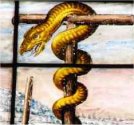
[ The following entry concerns this week's Torah reading, parashat Chukat... ]
06.12.13 (Tammuz 4, 5773) "And the LORD said to Moses, 'Make a fiery serpent (שָׂרָף) and set it on a pole (נֵס), and everyone who is bitten, when he sees it, shall live'" (Num. 21:8). "And as Moses lifted up the serpent (הַנָּחָשׁ) in the desert, so must the Son of Man be lifted up, that whoever believes in him may have eternal life (חַיֵּי עוֹלָם)" (John 3:14-15). Humanity as a whole has been "bitten by the snake" and needs to be delivered from its lethal venom. God's remedy for the sting of death is to "look up" to behold how the underlying source of our sickness is overcome by the greater power and mercy of God. Everyone who is bitten, when he sees it, shall be made whole and live...
אֵלֶיךָ נָשָׂאתִי אֶת־עֵינַי הַיּשְׁבִי בַּשָּׁמָיִם
e·le·kha · na·sa·ti · et · ei·nai · hai-yo·she·vi · ba·sha·ma·yim

To you I lift up my eyes, O you who are enthroned in the heavens!
(Psalm 123:1)

Notice in the verse above the spelling for ha-yoshevi (הַיּשְׁבִי), "the one enthroned," is unusual, since it contains a Yod (י) suffix. The normal spelling would be simply ha-yoshev (הַיּשֵׁב). The sages say that the Yod, the smallest of letters, represents the heart of prayer, the inner realm of spirit. God is enthroned "for me," that is, within my heart; O LORD, put your Spirit (י) within me as I look to you in prayer!
The psalm continues with an appeal for God's merciful deliverance: "Behold, as the eyes of servants look unto the hand of their masters, and as the eyes of a maiden unto the hand of her mistress; so our eyes wait upon the Lord our God, until that he have mercy upon us. Have mercy upon us, O Lord, have mercy upon us (חָנֵּנוּ יְהוָה חָנֵּנוּ): for we are exceedingly filled with contempt" (Psalm 123:2-3). As we lift up our eyes to behold God's miracle – his nes gadol (נֵס גָדוֹל) given in Yeshua our Messiah – we overcome by the power of God.
It is said that "God creates the cure before the plague." Yeshua is the Lamb slain "from the foundation of the world." He is the promised "Serpent Slayer" who would redeem humanity from the curse of death. The serpent that had deceived Eve in the paradise of Eden has been overcome (Gen. 3:15). The sacrificial death of the Savior upon the cross is the Tree of Life for those who take hold of Him. For more on this, see "The Gospel in the Garden."
Purging with Hyssop....
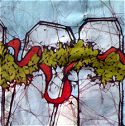
[ The following entry concerns this week's Torah reading, parashat Chukat. Please read the Torah portion to "find your place" here. ]
06.11.13 (Tammuz 3, 5773) It is noteworthy that cedarwood, hyssop, and scarlet thread were used not only for cleansing the leper (Lev. 14) and for cleansing from contact with death (Num. 19), but also during the ratification of the covenant at Sinai (Exod. 24:8; Heb. 9:19-20) and indeed during the crucifixion of our Lord. Of course hyssop (אֵזוֹב) is first mentioned regarding the application of the blood of the lamb upon the doorposts during the Passover (Exod. 12:22), and King David later appealed to God for cleansing saying, "purge me with hyssop, and I shall be clean" (Psalm 51:7). A hyssop branch was also used to offer vinegar to Messiah during the time of his crucifixion (John 19:29). Likewise the wood from a cedar tree (עֵץ אֶרֶז) was used to purify both the leper and those contaminated with death, and it is likely the type of wood used for the cross of Messiah. Finally, scarlet (שָׁנִי) thread symbolizes both blood and royalty, and appears in the birth of Judah's children Zerach and Peretz (Gen. 38:28), in the coverings of the Tabernacle, as a sign of Rahab's faith (Josh 2:8,21), and as the color of the robe of Messiah during his crucifixion (Matt. 27:28).
Cross, Stake, or Tree?

06.11.13 (Tammuz 3, 5773) Some people say that the word "cross" should be translated as "stake" or "tree" instead, claiming that the shape of the instrument that Jesus was crucified upon was not cross-shaped or "cruciform." Now while the Greek word translated "cross" (i.e., σταυρός) is not fully described in the New Testament, according to ancient historians there were different "shapes" of the stakes used for crucifixion, including the crux simplex (|), the crux immissa (+), the crux commissa (T), and even stakes shaped as an X or Y. The "T" shape (commissa) was described by the historian Josephus, and is likely the form used to crucify Jesus, since the early Christians all referred to it that way. There are also ancient Greek (pre-Christian era) descriptions of crucifixion. For example Herodotus (450 BCE) wrote: "they crucified him hands and feet stretched out and nailed to cross-pieces," which suggests that the cross immissa or commisa shape was used in ancient times...
So it is likely that Yeshua was crucified on a stake made of cedar wood that was formed by attaching a crossbeam to a pole that was inserted into the ground. It is also likely that he carried only the crossbeam, or gibbet, as he walked to Golgotha to be hung up to die, since the stake would have weighed 300 pounds or so, and after brutal flogging under Roman whips it is unlikely that even the strongest of men could carry one... Moreover, the description of a Roman soldier putting a sponge on a hyssop stalk to give Yeshua a drink suggests that he was crucified on "short cross," since the stalk was usually less than two feet long. Regardless of the exact shape of the cross, however, death by crucifixion was horrifyingly shameful and unutterably painful.... but Yeshua went there for you.
Wounded Healer...

[ The following entry concerns this week's Torah reading, parashat Chukat. Please read the Torah portion to "find your place" here. ]
06.11.13 (Tammuz 3, 5773) Our Torah portion this week (Chukat) begins, zot chukat ha-Torah (זאת חֻקַּת הַתּוֹרָה), "this is the decree of Torah" (Num. 19:2). The language here is both striking and unique, suggesting that what follows is "the seminal decree" of the entire Torah... If we think about the meaning of the mysterious decree of the red heifer, however, we will realize that its ashes were used to create the "waters of separation" (i.e., mei niddah: מֵי נִדָּה) to cleanse people from contact with death (i.e., separation). To fulfill God's vital decree, however, required sacrificial love, since the priest who offered this service would become defiled (separated) for the sake of the healing of others... The Hebrew word for love is ahavah (אַהֲבָה), from a root verb (יָהַב) that means "to give." Love means giving of yourself to benefit another person (John 15:13). The central decree of Torah, then, beyond our ability to rationally understand, is that God's love is so great that it is willing to become dust and ashes on our behalf so that we might find blessing and life...
The mitzvah of parah adamah (i.e., the red heifer) represents the suspension of logic in deference to the Divine Will. This attitude is not restricted to this mitzvah. Scripture introduces the mitzvah of the parah adamah with the words "this is the law of the Torah." Surrendering one's own reasoning and accepting the superior reasoning of Hashem is the law of the entire Torah... To the extent that we let go of our own will, we can understand the Divine will. Our ancestors at Sinai understood this ideal when they proclaimed, "we will do and then we will understand." Torah is not beyond our understanding, but we must be willing to make the sacrifices that true Torah understanding demands. - Living Each Day, Rabbi Abraham Twerski
Yeshua willingly became unclean on our behalf - through contact with our sin and death - so that we could become clean (Isa. 53:4, 2 Cor. 5:21, Gal. 3:3, Eph. 5:2, Titus 2:14). The pure became impure through His sacrificial offering. Because of Him, we have been cleansed from our sins "by a better sprinkling" than that which the Tabernacle of Moses could afford (Matt. 26:28, Heb. 9:14, 12:24, Eph. 1:7, 1 Pet. 1:2,18-19, Rom. 5:9; Col. 1:14, 1 John 1:7, etc.).
Note: The Hebrew word "chok" means a "divine decree," related to a verb meaning "to engrave" (חָקַק). The sages say that the word is directed to a desire to do God's will that is "engraved" upon the heart rather than simply understood with the intellect (2 Cor. 3:3). The first time "chok" (חוֹק) appears in the Torah concerns Abraham's obedience of faith as demonstrated by the sacrifice of his beloved son (Gen. 26:5), and the second time concerns the sacrifice of the Passover Lamb of God: "This day shall be for you a memorial day, and you shall keep it as a feast to the LORD; throughout your generations, as an eternal decree (חֻקַּת עוֹלָם), you shall keep it as a feast (Exod. 12:12-13). Because both the Akedah and the sacrifice of the Passover lamb reveal God's yeshuah, his salvation, we are to engrave the significance of our deliverance by the Lamb of God within our hearts forever... Amen, just as God Himself has so engraved us upon his own heart, it is written, "behold, I have engraved you on the palms of my hands" (הֵן עַל־כַּפַּיִם חַקּתִיךְ) - Isa. 49:16a.
Faith and Reason...

[ The following entry concerns this week's Torah reading, parashat Chukat. Please read the Torah portion to "find your place" here. ]
06.10.13 (Tammuz 2, 5773) The divine decrees, that is, the "chukkim" (חֻקִּים), test how we understand our faith, since they are not based on rational criteria. By way of contrast, the commandment that we should not steal, for example, makes logical sense, since if no one observed it, society itself would be impossible. Therefore this commandment, like many others, does not test how we comprehend our faith as much as it tests our obedience. The divine decrees, however, require bittachon - that is, abandoning our need to understand so that we can completely cling to God's wisdom: "Trust in the LORD with all your heart, and lean not to your own understanding."
בְּטַח אֶל־יְהוָה בְּכָל־לִבֶּךָ
וְאֶל־בִּינָתְךָ אַל־תִּשָּׁעֵן
be·tach · el-Adonai · be·khol · lib·be·kha
ve·el · bi·na·te·kha · tish·a·ein

"Trust in the LORD with all your heart,
and do not lean on your own understanding"
(Prov. 3:5)

Bittachon requires that we renounce reliance upon ourselves, upon our ego's ability to understand reality, and instead trust the LORD be'khol levavkha, "with all our heart." Any other supposed source of security than that from the LORD God Almighty is sheer folly. The Greek Septuagint never translates batach (בָּטָח) with the idea of "believing in," but rather as "to hope" or to be persuaded (πείθω) that God alone is your real security and help...
Exercising bittachon does not imply that we should abandon reason or the pursuit of wisdom, of course, but it does require that we keep in mind that all thinking is to be conditioned upon the truth that God is the Sovereign Power that orders and defines all substance and reality... We still form our plans, but we add the thought: im yirtzeh HaShem, "if it pleases God may this come to pass" (James 4:15). We have to keep our balance between "blind faith" and faithful rationalizations: We trust in God, even when it doesn't make sense, and we trust in God, even when it does...
This is what the LORD says: "Let not the wise boast of their wisdom or the strong boast of their strength or the rich boast of their riches but let the one who boasts boast about this: that they have the understanding to know me, that I am the LORD, who exercises kindness, justice and righteousness on earth, for in these I delight," declares the LORD (Jer. 9:23-24).
Paradox and Faith...

[ The following entry concerns this week's Torah reading, parashat Chukat (Num. 19:1-22:1). Please read the Torah portion to "find your place" here. ]
06.10.13 (Tammuz 2, 5773) The paradox of the red heifer sacrifice is precisely this: it purified those defiled by contact with death, yet it defiled all those who were connected in any way with its preparation... And though it was a prescribed sacrifice, it was offered "outside the camp," that is, on an altar that was not part of the Temple.... Likewise Yeshua suffered outside the gate to sanctify the people through his own blood.
Commandments (mitzvot) that defy reason are called "chok" (חק). The Jewish sages tend to focus on the Red Heifer as the "mother of all mystery mitzvas," but surely we must go back to the Akedah - that is, to the sacrifice of Isaac at the hand of his father Abraham - as the greatest of God's decrees that defy human reason. The willingness of both Abraham and Isaac to obey - despite their inability to understand - was a direct result of their unwavering faith in God's love and promises. Therefore the sacrifice of the ram caught in the thicket represented the "ashes of Isaac" that foretold of the great Lamb of God to come...
The heart of our faith says simply: "Jesus saves." His sacrifice saves us from sin and death, yet this also is "chok" - a matter of faith - since like the decree of the red heifer or the offering of Isaac, it does not make rational sense. We are not able to logically understand how or why this is needed, yet we believe anyway; we may seek reasons or explanations, but ultimately it is a matter of divine mystery, just as the darkness covered the earth while the Savior suffered for us on the cross at Calvary (Mark 15:22). "Jesus saves" is the mystery of our confession. We are cleansed by our contact with sin and death through him, just as he bears our sin and defilement on our behalf: "God made the One who did not know sin to be sin for us, so that in him we would become the righteousness of God" (2 Cor. 5:21).
"But when Messiah appeared as a High Priest (כּהֵן גָּדוֹל) of the good things that have come, then through the greater and more perfect tent (not made with hands, that is, not of this creation) he alone entered once for all into the Holy Places, not by means of the blood of goats and calves but by means of his own blood, thus securing an eternal redemption (גְּאוּלַּת עוֹלָם). For if the blood of goats and bulls, and the sprinkling of defiled persons with the ashes of a heifer (אֵפֶר הַפָּרָה), sanctify for the purification of the flesh, how much more will the blood of Messiah (דַּם הַמָּשִׁיחַ), who through the eternal Spirit (בְּרוּחַ עוֹלָם) offered himself without blemish to God, purify our conscience from dead works to serve the living God (אֱלהִים חַיִּים)?" – Heb. 9:11-14
The Torah of the new covenant is inner, deeper, and eternal, whereas the Torah of the older covenant is outer, limited, and subject to obsolescence (Heb. 7:12; 8:13). The older covenant foretold of the coming Substance by means of the "ashes that purify the impure yet make the pure, impure." Only after we have been "sprinkled with the ashes" are we made clean from death; only when we make contact with the "ashes of Yeshua" offered on our behalf are we cleansed from sin and death (1 Pet. 1:2; Heb. 10:22).
Parashat Chukat - פרשת חקת

[ The following entry concerns this week's Torah reading, parashat Chukat (Num. 19:1-22:1). Please read the Torah portion to "find your place" here. ]
06.09.13 (Tammuz 1, 5773) Among other things, this week's Torah portion (chukat: חֻקַּת) includes the unusual ritual law of the Red Heifer (parah adumah) whose ashes purify those contaminated by contact with death. This ritual is considered chok (חק) within the Jewish tradition, meaning that it makes no apparent rational sense. The Talmud states that of all the various commandments, judgments, and decrees found in the Torah, this is the only one that King Solomon could not fathom, causing him to exclaim: "I said I would be wise, but it is far from me" (אָמַרְתִּי אֶחְכָּמָה וְהִיא רְחוֹקָה מִמֶּנִּ, Eccl. 7:23). However, as I hope you will see, the symbolism of the red heifer clearly foreshadows the sacrifice of the Messiah that delivers us from the uncleanness of death... "You are far, farther than the heavens and near, nearer than my own body" (ben Asher).
It has been said that we are not punished for our sins, but by means of them, which is to say that the act of sinning itself is to suffer spiritual separation, loss, and even death itself... King David understood that because of his sin he became "unclean" through his contact with death, and therefore he used the imagery of being sprinkled with the waters of the red heifer in his appeal to the LORD: "Purge me with hyssop, and I shall be clean; wash me, and I shall be whiter than snow."
תְּחַטְּאֵנִי בְאֵזוֹב וְאֶטְהָר
תְּכַבְּסֵנִי וּמִשֶּׁלֶג אַלְבִּין
te·cha·te·ei·ni · ve·e·zov · ve·et·har
te·kha·be·sei·ni · u·mi·she·leg · al·bin

"Purge me with hyssop, and I shall be clean;
wash me, and I shall be whiter than snow"
(Psalm 51:7)

We find cleansing and healing from the LORD: "Come, let us reason together," says the LORD. "Though your sins have stained you like scarlet, you can become white like snow; even though they are red as crimson, they will be like wool" (Isa. 1:18). As our Torah portion this week explains, scarlet was one element added to the fire of the red cow to create the purifying waters that were applied by hyssop branches. The Hebrew word for "scarlet" (שני) means "double-dyed," from shanah (שנה), to repeat or double, suggesting the deep stain of sin within the human heart... Scarlet was also added to the running water when the metzora ("leper") was cleansed.
You can follow the "scarlet thread" throughout the Scriptures, of course. In connection with our Torah portion, it is noteworthy that scarlet was the color of Yeshua's robe when bearing our sins (Matt. 27:28), and Yeshua indeed is the perfect fulfillment of the red heifer, the substance of all its symbolism (Heb. 9:13-14). Like the heifer, Yeshua was completely without sin or defect (2 Cor 5:21; John 8:46); He was sacrificed outside the camp (Heb 13:13); He made Himself sin for us (2 Cor 5:21); His sprinkling makes us clean (1 Pet 1:2; Heb 12:24; Rev 1:5); and the "water of separation" that His sacrifice created is the means by which we are made clean from the impurity of sin (Eph 5:25-6; Heb 10:22). Thank God for the eternal cleansing we have in Yeshua our Messiah!
Note: Whenever we consider the symbolism and relevance of the red heifer sacrifice, it is important to clarify our terms.... It is overly simplistic for Christians to regard the Torah (תּוֹרָה) using the general term "law." The writings of Moses include a wide range of material, including sacred history, poetry, songs, prophecies, traditions, rituals, commandments, and covenants. In general, the ancient sages divide the Torah into aggadah (stories) and halakhah (legal material), though the legal material is subdivided into chukkim (חֻקִּים), that is, "divine decrees" given without a specified reason, and mishpatim (מִשְׁפָּטִים), or "moral laws" given for a clearly specified reason (an example of the former is the decree of the Red Cow; of the latter, the commandment against stealing). In addition, the Torah includes eidot (עֵדוֹת) or "testimonials" (from the root word, 'ed, "witness") that commemorate events in redemptive history, such as Shabbat, the Passover seder, and the other holidays of the Jewish calendar (i.e., the mo'edim [מוֹעֲדִים], lit. "the appointed witnesses"). For more on this subject, see "Taryag Mitzvot."
Our First and Last Amen...

06.07.13 (Sivan 29, 5773) The first letter of the Hebrew alphabet, the letter Aleph (א), pictures the Word of God, the Holy Beginning. Aleph is "three-in-one," constructed from two Yods (representing "hands") joined by a diagonal Vav (representing a man). One Yod (י) reaches upward while the other reaches downward, and both extend from the "fallen" Vav (ו) that pictures a "wounded Man" or Mediator (1 Tim. 2:5). In the Hebrew numbering system, Yod = 10 and Vav = 6, so adding up the three parts of Aleph yields 26, the same value as the Name of the LORD, YHVH (יהוה). All of this linked together, friends. The very first letter of the alphabet, the "king of the letters," pictures the loving Word of God who mediates heaven and earth so that we can experience and know the meaning of God's redeeming love. Similarly, the first letter of the Bible is the Bet (בּ) in bereshit (בְּרֵאשִׁית), and the last is the Nun (ן) in amen (אָמֵן). Put together, we have ben (בֵּן), the Hebrew word for "son." Yeshua, God the Son, therefore is rightly called "the Amen, the faithful and true witness, the beginning of God's creation" (Rev. 3:14).
The Jewish sages say that "amen" serves as an declaration of the Kingship of God (often said quietly before the reciting the Shema) that may be understood as an acronym for the phrase El Melekh Ne'eman (אֵל מֶלֶךְ נֶאֱמָן): "God (אֵל) is a faithful (נֶאֱמָן) king (מֶלֶךְ)." For all the promises of God find their "Yes" in the Messiah. That is why it is through him that we utter our Amen to God for his glory" (2 Cor. 1:20).
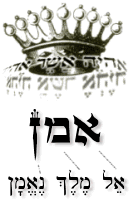 |
Becoming who we are...

06.07.13 (Sivan 29, 5773) Yeshua tells us to take up the cross and die daily because that which is dead no longer suffers from ambivalence and carnal inner conflict... There are no "half-measures" here; when we accept that we have already been crucified with Messiah, we confess that our true life is not here, in this world, but is bound up in Him, and that God alone is our ultimate concern and end. In that sense, the life we now live in the flesh "catches up" with the truth and power that God has decreed for our salvation.
The Warning of Korah...

[ The following entry concerns this week's Torah reading, parashat Korach. Please read the Torah portion to "find your place" here. ]
06.07.13 (Sivan 29, 5773) The example of Korah is a severe warning for us not to transgress what God has ordained lest we face severe judgment... In this connection let me remind you that the terms of the new covenant (בְּרִית חֲדָשָׁה) are non-negotiable, and those who attempt to come before God apart from the cross - that is, apart from the shed blood of Messiah for atonement - likewise encroach upon the Divine Presence. Moreover, it needs to be stated that simply believing that Jesus is the promised Messiah is not sufficient for salvation. In the Book of Galatians, Paul invoked a divine curse on anyone who denied that the work of Yeshua is all we need to be justified and declared righteous by God (Gal. 1:8-9). Those who therefore claim that "something more" is needed than the cross (e.g., circumcision, law-keeping, etc.) remain under the curse (חֵרֶם) demanded by the law (Gal. 3:10; John 3:36). This is not a mere difference of opinion regarding how people are "justified" before God, since Paul goes on to make the case that those who teach otherwise are not truly saved -- even if they should profess that Yeshua is the true Messiah and Savior of Israel! Therefore Messianic teachers who falsely claim that Christians must "follow the law" to be made right with God are liable to the curse of the law. These people are not simply misinformed; according to Paul and the witness of the Holy Spirit, they are actually lost souls. "Beware of the leaven of the Pharisees," chaverim...
It's been wisely said that we must "unlearn" a lot during the days of our sojourn in this world, and that is especially true for people who still assume that they know something about life. "If anyone imagines that he knows something, he does not yet know as he needs to know" (1 Cor. 8:2). And it is also true, I'm afraid, for religious people, that is, for those who regard spirituality as a litany of "do's and don'ts" or a recipe of rituals rather than as receiving a new identity given to us by the miracle of God.
"Anyone who has set aside the law of Moses (תּוֹרַת משֶׁה) dies without mercy on the evidence of two or three witnesses. How much worse punishment, do you think, will be deserved by the one who has trampled underfoot the Son of God, and has profaned the blood of the covenant (דַּם הַבְּרִית) by which he was sanctified, and has outraged the Spirit of grace?" - Heb. 10:28-29
The Breath of God...
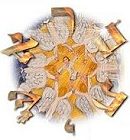
[ The following entry concerns this week's Torah reading, parashat Korach. Please read the Torah portion to "find your place" here. ]
06.06.13 (Sivan 28, 5773) A verse from this week's Torah (Korach) reveals another great Name of God: Elohei ha-ruchot lekhol basar (אֱלהֵי הָרוּחת לְכָל־בָּשָׂר), which can be translated "the God of the breath of all flesh" (Num. 16:22). The LORD is the Source of your breath, the One who exhales to you nishmat chayim (נִשְׁמַת חַיִּים), the "breath of life" (Gen. 2:7; Job 12:10). This name appears only one other place in Torah. After Moses accepted the fact that he would soon die, he prayed: "May the LORD (יהוה), "the God of the spirits of all flesh" (אֱלהֵי הָרוּחת לְכָל־בָּשָׂר), appoint a man over the congregation who shall go out before them ... that the congregation of the LORD may not be as sheep that have no shepherd." So the LORD said to Moses, "Take Joshua the son of Nun (יְהוֹשֻׁעַ בִּן־נוּן), a man in whom is the Spirit (רוּח), and lay your hand on him" (Num. 27:16-18).
The Talmud notes that the word Nun (נוּן) means "fish," a symbol of activity and life. Joshua, the chosen one who succeeded Moses and led the people into the Promised Land, was the chosen "son of life" (בִּן־נוּן) - a clear picture of Yeshua our Messiah, the "spirit-filled good Shepherd" who would lay down His life for the sheep (John 10:11). The LORD is indeed the "God of the breath of all flesh." When Yeshua cried out, "It is finished" and breathed his last breath as He died for our sins upon the cross, the greatest exhalation of the Spirit occurred, the greatest sigh, the greatest utterance was ever declared. The sacrificial death of Yeshua for our deliverance was God's final word of love breathed out to those who are trusting in Him. May he breathe on you saying, "Receive the Holy Spirit" (John 20:22).
Marks of False Teachers...

[ The following entry concerns this week's Torah reading, parashat Korach. Please read the Torah portion to "find your place" here. ]
06.06.13 (Sivan 28, 5773) False teachers tend to be "people pleasers." They desire the esteem of the crowd, the praises of men, and therefore appeal to the murmurings of the unregenerate heart: "Do not prophesy to us what is right; speak unto us smooth things, prophesy deceits" (Isa. 30:10). They flatter people by "tickling their ears"; they offer either platitudes or "new revelation" based on their own imagination. Consequently, they tend to be grandiose and quick to disparage God's faithful servants. Thus Korah accused Moses of wanting to exalt himself, when this only disclosed the evil lurking within his own heart (Num. 16:3). False teachers speak in their own name and presume to be something when they are nothing (Gal. 6:3). "The prophets prophesy lies in my name: I sent them not... they are prophesying to you a lying vision, the deceit of their own minds" (Jer. 14:14). They secretly deny that Yeshua is LORD (יהוה), though they may offer "lip service" about his importance (2 Pet. 2:1). Instead of focusing on the message of the gospel and the greatness of salvation found in Messiah, they "major in minors," passing over the weightier matters for the sake of various divisive doctrines (Matt. 23:23). They desire to be teachers of the law, but they have no idea what they are talking about (1 Tim. 1:7). Often such deceivers have natural charisma, charm, "good hair," and an ability to bewitch people through buttery oratory or clever presentation (Col. 2:4,8). Often they focus on the truth of the head rather than the truth of the heart; they are more concerned with being vindicated than healing broken hearts. Finally, they tend to exploit people to promote their own self-serving agenda (1 Pet. 2:1-3). They make "merchandise" out of the gullible, regarding them as the means to support their "ministry" rather than as precious souls in need of God's love and care...
False teachers inevitably "twist the Scriptures" by offering unsound interpretations contrary to the ruach, or spirit of the Hebrew prophets, and by evading the commandment to "rightly divide" the word of Truth according to basic logic and clear thinking (2 Tim. 2:15; 2 Pet. 1:20-21; 3:16). In Christian circles, they often come in the name of the law (legalism) or in the name of grace (licentiousness), but rarely do they take the trouble to carefully (and equitably) work through the paradoxical tensions. False teachers are uncomfortable humbly confessing they don't know something, and therefore they are quick to style themselves as an infallible prophet or source of authoritative wisdom...
There is no substitute for taking the time and energy to humbly study Torah, friends, and we should be suspicious of those who claim special insight when it is evident that they have not really labored working through the Scriptures... All disciples of Yeshua are called "students," or talmidim (תַּלְמִידִים), a word that comes from lamad (לָמַד) meaning "to learn" (the study of Scripture is called talmud Torah (תַלְמוּד תּוֹרָה) from the same root). Among other things, then, following Yeshua means becoming a student of the Jewish Scriptures that he both loved and perfectly fulfilled (Matt. 5:17-18; Luke 24:44-45). Only after learning the truth of the Scriptures will you be equipped to "go to all the nations and teach" others (Matt. 28:19). This is accomplished not merely by explaining (propositional) doctrine but by kiddush HaShem -- sanctifying the LORD in our lives (1 Pet. 1:15-16). "You shall know them by their fruits..."
Yeshua brings the kingdom of God "at hand," that is, into the realm of this fallen world. False teachers are emissaries of evil, commissioned by the devil to seduce, deceive, and ensnare souls; they disguise themselves as an "angel of light" (2 Cor. 11:14). God allows false teachers to justify the desires of the unregenerated heart, for such teachers find their audience among those who want to be deceived (Matt. 13:24-30; 15:14). In other words, there can be no false teachers apart from false believers who go along with the ruse. In light of this possibility, we should be careful to honestly examine our hearts. What are your motives for faith? What draws you to Yeshua? Do you accept the message of the gospel or are you trusting in something else? Are you really one of his "sheep"? Do you hear his voice, or are you heeding something contrary to the truth of the Holy Spirit?
Just as the easiest way to spot a counterfeit dollar bill is to know the various details of the original, so our best defence against false teaching is to know the details of doctrine and to use discernment as the LORD helps us "test the spirits" (1 John 4:1). This implies that we "build ourselves up in the most holy faith" by carefully (i.e., humbly) studying the word of God - especially the Torah, since the Torah is the foundation of all that follows (Jude 1:20). In this way we will be able to accurately wield the Sword of the Spirit (2 Tim. 2:15-16, 2 Pet. 1:19-20). In order to grow, we must have "good soil" for the seed of the word to take root. We "get rooted by knowing the roots" of our faith! Studying the Scriptures and praying in the Spirit of Truth keeps us securely in the love of God as we wait for the mercy of Yeshua who gives us eternal life (Jude 1:21).
Note: For more on this very important subject, see "The Message of Jude." For some thoughts about how to test the teaching of various Messianic ministries, click here.
Covenant of Salt...

[ The following entry concerns this week's Torah reading, parashat Korach. Please read the Torah portion to "find your place" here. ]
06.05.13 (Sivan 27, 5773) The Torah sometimes symbolically refers to a perpetual or eternal covenant as brit melach (בְּרִית מֶלַח), or a "covenant of salt" (e.g., Num. 18:19; Lev. 2:13; 2 Chr. 13:5). Salt (melach) is regarded as a symbol of eternity (עוּלָם) because of its preservative properties. Salt is therefore the opposite of chametz (leavening), since it does not ferment and protects food from decay. All sacrifices at the altar were to be offered with salt and free from both leaven and honey (Lev. 2:11-13). Likewise our service to God is to be seasoned with salt (full of zest, savor, earnestness) yet void of leaven (pride, the rise of the lower nature) and honey (insincere flattery). Since the sacrifices were intended to serve as a means of korban, that is, drawing near to God, they represented life offered for the sake of communion with God, and they were to be partaken of with the "aroma" of reverent gratitude. Yeshua asked, "You are the salt of the earth. But if the salt loses its saltiness, how can it be made salty again?" (Matt. 5:13). Pure sodium chloride (salt) is chemically stable unless it gets diluted by other things. When Yeshua warned us of salt losing its saltiness, then, he cautioned us not to so assimilate with culture that we no longer would serve as a life-giving source of seasoning. Our conversation is to be "seasoned with salt," testifying of the grace given in Messiah (Col. 4:6). "Let us continually offer up sacrifices of thanks (זִבְחֵי תוֹדָה) to God, the fruit of lips that acknowledge his name" (Heb. 13:15).
During Shabbat communion, it is customary to salt the challah (bread) three times to remind us of the "covenant of salt" we have with God in Messiah. Note that the letter value of the words "salt" (מֶלַח) and "bread" (לֶחֶם) are both 78, which is the same value as YHVH (יהוה), i.e., 26, multiplied by three (3x26=78). "Holy, holy, holy..." Sacrifices offered at the altar are called the "bread" of God (Lev. 21:8), and we partake of the daily bread of Yeshua's communion when we draw near to God through Him.
The Meaning of Life...

[ You can't die "in him" if you have never lived in him; and if you live in him, nothing can separate you from his love and life... ]
06.05.13 (Sivan 27, 5773) The Hebrew word for "life" is chayim (חַיִּים), which is written in the plural to imply that life cannot be lived alone... Embedded within the word itself are two consecutive Yods (יי), representing unity in plurality (Yod-Yod is also a Name of God). Therefore the LORD is called Elohim Chayim (אֱלהִים חַיִּים), "the Living God," and we only come to life through our union with Him. Chayim may be formed from the word chai (חי), "alive" combined with the particle im (אם), "if," suggesting that being alive is conditional on our union with God in the truth. "Whoever believes in the Son has eternal life (חַיֵּי עוֹלָם); whoever refuses the Son shall not see life, but the separation of God remains" (John 3:36). Life and peace are therefore inextricably connected, and those who refuse Yeshua, the Prince of Peace (שַׂר־שָׁלוֹם), therefore separate themselves from unity with God. Yeshua alone is the means of receiving the divine life: "Whoever has the Son has the life (הַחַיִּים); but whoever does not have the Son of God does not have the life" (1 John 5:12).
God has "made us alive together with Messiah" (Eph. 2:5). The two Yods in the word "life" (חַיִּים) can also be seen as the two outstretched arms of Yeshua, or one Yod can represent our spirit and the other the Spirit of God. God's life is such that it is never diminished as it shared but instead grows in miraculous ways. This is alluded to by the Hebrew word for love (i.e., ahavah: אהבה), the gematria of which is thirteen (1+5+2+5=13), but when shared with another it is multiplied: 13 x 2 = 26 - the same value for the Sacred Name (יהוה), i.e., (10+5+6+5=26). The love of God given in Yeshua is the very life of the universe...
The word chayim (חַיִּים) is also written in the plural to indicate that each person potentially contains a "universe of lives" within him or her. Spiritually, your soul is a unity that contains a multiplicity of changes, yet remains a distinct identity. Physically, when Cain murdered his brother Abel, it is written, "the voice of your brother's bloods (plural) cries out from the ground" (Gen. 4:10), indicating that Abel's descendants also cried out. In light of this the Talmud states, "Whoever destroys a soul, it is considered as if he destroyed an entire world; and whoever saves a life, it is as if he saved an entire world" (Sanhedrin 37a).
What We Really Need...

06.05.13 (Sivan 27, 5773) "Your heavenly Father knows what you need before you ask him" (Matt. 6:8). We sometimes pray for what we think we need but overlook what we really need. For instance, we may pray for health, material blessing, and opportunity, but what we really need is the ability to trust, the willingness to surrender our lives to God without qualification, and the grace to see the good in others and not their faults. These needs are just as real as our need for food and clothing, since apart from grace to extend empathy and love toward others, we will never be truly happy. Love "overlooks" a multitude of sins; it looks beyond the present moment to see with compassion, of kindness, of empathy... What we really need, then, is to be after God's own heart, to see other people as God sees them, and to overlook matters that offend or feed our sense of pride. This is what we truly need, and therefore we trust that the Lord our God mercifully "decodes" our apparent petitions to express what the Spirit of God groans on our behalf (Rom. 8:26).
מְכַסֶּה־פֶּשַׁע מְבַקֵּשׁ אַהֲבָה
וְשׁנֶה בְדָבָר מַפְרִיד אַלּוּף
me·kha·seh · pe·sha' · me·va·kesh · a·ha·vah
ve·sho·neh · ve·da·var · ma·frid · a·luf

"Whoever covers an offense seeks love,
but he who repeats a matter separates close friends."
(Prov. 17:9)

A Matter of Life and Death...
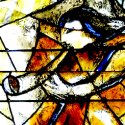
[ The following entry concerns this week's Torah reading, parashat Korach. Please read the Torah portion to "find your place" here. ]
06.05.13 (Sivan 27, 5773) We read in our Torah portion the terrible fate of Korah and his co-conspirators: "And the earth opened its mouth and swallowed them up" (Num. 16:32). Life is a serious business, an irrepeatable opportunity. Many trifle their way to the grave, fully unprepared for the shock of the world to come... How few make it the great business of life to prepare themselves "until their change comes" (Job 14:14); how few consciously number their days to obtain a heart of wisdom (Psalm 90:12)? We mustn't fool ourselves by thinking we have a long road ahead before we face who we are at the time of our death (Luke 12:19-21). "No one knows the day or hour," yet it is certain to come, and wisdom bids us be prepared. All must die; there is no escape (Heb. 9:27; Eccl. 8:8). In light of this somber truth, do you reflect on its significance? Have you taken time to see how it will be for you at your death? Allow such thoughts to awaken you from your careless and unwatchful state, and admonish you to lay up treasure in heaven (Matt. 6:20). Considering the vastness of eternity, human life is likened to a mere vapor that quickly passes away (Psalm 103:15-16). It is madness to put off that which is of ultimate concern until the last moment.
אֵין אָדָם שַׁלִּיט בָּרוּחַ לִכְלוֹא אֶת־הָרוּחַ
וְאֵין שִׁלְטוֹן בְּיוֹם הַמָּוֶת
וְאֵין מִשְׁלַחַת בַּמִּלְחָמָה
וְלא־יְמַלֵּט רֶשַׁע אֶת־בְּעָלָיו
ein · a·dam · sha·lit · ba·ru·ach · likh·lo · et · ha·ru·ach
ve·ein · shil·ton · be·yom · ha·ma·vet
ve·ein · mish·la·chat · ba·mil·cha·mah
ve·lo · ye·ma·leit · re·sha · et · be·a·lav

"No man has power to retain the spirit,
or power over the day of death.
There is no discharge from this war,
nor will wickedness deliver those who are given over to it."
(Eccl. 8:8)

Of course dying in the LORD assumes you are really "in Him," that is, that you are a person whose heart is known by Him (1 Cor. 8:3). You can't die in him if you have never lived in him. In this world we learn to die, and as we die in Him, so we will live in him. Resolve this within your heart: "Blessed are the dead who die in the Lord" (Rev. 14:15).
Concerning the prospect of death we are not without hope, of course, since Yeshua has overcome death for us and secured our place in heaven (John 11:25; Heb. 2:9-10). "We must all die; we are like water spilled on the ground, which cannot be gathered up again. But God will not take away life, and he devises means so that the banished one will not remain an outcast" (2 Sam. 14:14). Though physical life inevitably returns us to dust (Heb. 9:27), death does not have the final word, since God wonderfully "devises the means by which the banished are brought back home." If you belong to the Lord, your death is the day of precious homecoming to be with your beloved Savior: "For me to live is Messiah, and to die is gain" (Phil. 1:21). As it is written, "just as we have borne the image of the man of dust, we shall also bear the image of the man of heaven" (1 Cor. 15:49).
Abraham Heschel once wrote, "God is of no importance unless he is of supreme importance." Stated differently, it is impossible to be indifferent toward God. Today we are on the way to face our destiny, even if we suppress this truth through busyness and other distractions. Again, life is a vapor; no one knows the day or hour of death; so we must endeavor to make our peace with God, to serve him in readiness, and so be prepared for whatever may come. Should we deny the reality of our death, we risk wasting our days, being seduced into the mere semblance of life. After all, what is life apart from life in Jesus?
Blaise Pascal once wrote: "I can feel nothing but compassion for those who sincerely lament their doubt, who regard it as the ultimate misfortune, and who, sparing no effort to escape from it, make their search their principal and most serious business. But as for those who spend their lives without a thought for this final end, I view differently. This negligence in the matter where they themselves, their eternity, their all are at stake, fills me more with irritation than pity: yea, it astounds and appalls me... (Pensees, 427). Regarding such need for spiritual sobriety, Kierkegaard comments: "Listen to the cry of a woman in labor at the hour of giving birth - look at the dying man's struggle at his last extremity, and then tell me whether something that begins and ends thus could be intended for enjoyment."
The sages advise: "Repent one day before you die." But who knows the day of one's death in advance? Therefore live each day as if it were to be your last, and may God help you make the decision to "seek the LORD while He may be found; call upon Him while He is near" (Isa. 55:6). Amen. May the LORD quicken these matters to our hearts...
Chief Seats at Synagogue...
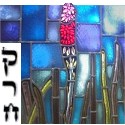
[ The following entry concerns this week's Torah reading, parashat Korach. Please read the Torah portion to "find your place" here. ]
06.04.13 (Sivan 26, 5773) Our Torah this week begins, "And Korah took" (וַיִּקַּח קרַח), which immediately suggests something about the character of the man. Though he was wealthy, esteemed among his tribe, and honored with the task of caring for the Ark of the Covenant, none of this was enough for Korah... There was an insatiable hunger, a "black hole" in his soul, an unrelenting envy, that drove him to madness and self-destruction. Korah was imprisoned by his own jealousy, arrogance, and spite. When he compared himself to Moses and Aaron, he felt overlooked, deprived, and therefore he justified in his desire to be honored. As an archetypal figure, Korach warns us against being swallowed up with egotistical envy or seeking the praises of men (Matt. 23:6-7). In the Kingdom of heaven, worldly success is sheer delusion. There are open and hidden riches. There is a pearl of great price, a treasure "hidden in a field." These riches are regarded as "fool's gold" to those who love this world and trust only in the realm of the phenomenal, but to those who trust in the LORD, they represent all that the heart needs...
The son of Zoma said: "Who is wise? He who learns from all people, as it is said: 'From all those who taught me I gained understanding' (Psalm 119:99). Who is strong? He who conquers his evil inclination, as it is said: 'Better is one slow to anger than a strong man, and one who rules over his spirit than a conqueror of a city' (Prov. 16:32). Who is rich? He who is satisfied with his lot, as it is said: 'When you eat the toil of your hands you are fortunate and it is good for you' (Psalm 128:2). 'You are fortunate' - in this world; 'and it is good for you' - in the World to Come. Who is honored? He who honors others, as it is said: 'For those who honor Me will I honor, and those who scorn Me will be degraded'" (1 Sam. 2:30). – Avot 4:1
Note: For more on this topic, see the article, "The Madness of Korah."
Finding Inner Peace...

06.04.13 (Sivan 26, 5773) The Hebrew word for peace is shalom (שׁלוֹם), a word that means "wholeness," "completeness," "well-being," and "healing" -- not merely the absence of strife. People often fight with others because they are not made whole within themselves. Just as we cannot really love others until we first learn to love ourselves, so we cannot have peace with others until we first find our own inner healing and peace. Often this means learning to forgive both ourselves and others (including God) so that we can let go of whatever troubles our heart. As we accept ourselves and let go of our fear, we learn to accept others and give up the need to defend ourselves. As Yeshua said, "Blessed (happy) are those who love peace - for they shall be called the children of God" (Matt. 5:9).
אַשְׁרֵי עשֵׂי שָׁלוֹם
כִּי בְּנֵי־אֱלהִים יִקָּרְאוּ
ash·rei · o·sei · sha·lom
ki · be·nei · E·lo·him · yi·ka·re·u

"Blessed are those who love peace,
for they shall be called the children of God."
(Matt. 5:9)

In most English translations we read, "Blessed are the peacemakers, for they shall be called the children of God." Note, however, that the Greek word translated as "peacemakers" (εἰρηνοποιοί) can also mean "those who love peace," that is, those who long for peace and pursue it (see Psalm 34:14). In Jewish ethical teaching, seeking peace is called redifat shalom (רְדִיפַת שָׁלוֹם) and is considered a primary heart quality. Rabbi Hillel is attributed as saying, "Be of the disciples of Aaron, loving peace and pursuing peace" (Pirke Avot 1:2). Before we can hope to make peace among others, however, we must first know inner peace. If we threaten this peace, we rise up against God, and thereby undermine his will in our lives. Those who love peace will be called the children of God.
Peace is the foundation of God's great work of deliverance in our lives. Yeshua is called Sar Shalom (שַׂר־שָׁלוֹם), the "Prince of Peace" (Isa. 9:6), since salvation brings reconciliation (i.e., peace) between God and man (Rom. 5:1) and sets us free from the fear of condemnation. When we walk in the peace of God (שְׁלוֹם הָאֱלהִים) that "surpasses all our understanding," we are empowered to be a blessing to others in your life. "The fruit of righteousness is sown in peace by those who make peace" (James 3:18).
We understand the Torah commandment, "Thou shalt not steal" (לא תִּגְנב) to imply more than being forbidden to steal from others, but also to include the prohibition against stealing from ourselves by failing to practice inner honesty. When we lie to ourselves, we "steal" from the truth, we rationalize what is unjust, and we thereby rob from ourselves the great blessing of inner peace. Indeed, the traditional sages say that every sin essentially constitutes theft from God. For instance, in his discussion of teshuvah (repentance), Maimonides notes that confession of sin is connected with theft (Num. 5:7). Rabbi Yitzchak of Gur asks, "Inasmuch as there are 365 prohibitions in Torah, why does Torah choose to specify the need to confess sin in regard to theft?" He goes on to answer by explaining that if someone borrows something for a specific use, he is not permitted to use it for any other purpose other than that specified, lest he abuse the privilege and "steal the use" of the item. Likewise, God lends the soul the ability to speak, hear, see, and so on, for the sake of living a godly life. If we abuse these things, for example, by using our lips and tongue to speak evil about another, we are using our faculties for a purpose other than God intended, and that constitutes theft. Therefore every sin is a form of theft, an act of "breaking faith with the LORD," and that is why Torah mentions confession of sin in connection with it.
The Path of Life...

06.04.13 (Sivan 26, 5773) Spiritual regeneration or transformation isn't just leaving the sinful past behind you, but discovering the glory of true and infinite life that sustains all of reality... There is change of perspective, of no longer backing away from the hell you came out of by turning around to focus on heaven, your true spiritual home. We are called to pursue the goal of the upward call of God in Messiah (Phil. 3:14). If we walk in the light, the LORD will cause us to know "orach chayim," the path of life; we will find joy in the Divine Presence; and we will discover pleasures that endure forever:
תּוֹדִיעֵנִי ארַח חַיִּים
שׂבַע שְׂמָחוֹת אֶת־פָּנֶיךָ
נְעִמוֹת בִּימִינְךָ נֶצַח
to·di·ei·ni · o·rach · chai·yim
so·va' · se·ma·chot · et · pa·ne·kha
ne·i·mot · bi·min·kha · ne·tzach

"You will cause me to know the path of life;
in your presence there is fullness of joy;
at your right hand are pleasures forevermore."
(Psalm 16:11)

Download Study Card
Have you discovered the glory and wonder of God's love, despite the many sins and the shame of your life? Do you know "in your gut" that his love means no longer having to defend or explain yourself? God's love enables you to quit hiding what you really are from Him; you can give up the pretense of being something you're not. When you turn to the Lord in the transparency of your brokenness, weakness, and neediness, you will find Him there, accepting you for who you really are... The path of life is -- the path of life!
The Month of Tammuz

06.03.13 (Sivan 25, 5773) On the Biblical calendar the fourth month of the year (counting from Nisan) is called Tammuz (תַּמּוּז). The name "Tammuz" is most likely of Sumerian origin, and some scholars identify it as the name of the Sumerian sun god (Shamash), a mythical power that represented the seasonal life/death/rebirth cycle (i.e., samsara). The idolatry of Tammuz was something God condemned (Ezek. 8:14). Nevertheless, despite repeated warnings from the prophets to renounce such idolatry, the Israelites refused to do teshuvah, and the destruction of the Holy Temple was therefore decreed. Indeed, the Fast of the 17th of Tammuz marks the start of the "Three Weeks of Sorrow," a 21 day period of national mourning for the destruction of the Temple that is completed on Tishah B'Av.
The Rosh Chodesh Blessing
Since the new moon of Tammuz anticipates the beginning of the Three Weeks of Sorrow, we humbly ask the LORD to help us turn to Him with all our hearts:
יְהִי רָצוֹן מִלְּפָנֵיךָ יהוה אֱלהֵינוּ וֵאלהֵי אֲבוֹתֵינוּ
שֶׁתְּחַדֵּשׁ עָלֵינוּ חדֶשׁ טוֹב בַּאֲדנֵינוּ יֵשׁוּעַ הַמָּשִׁיחַ אָמֵן
ye·hi · ra·tzon · mil·fa·ne·kha · Adonai · E·lo·hei·nu · ve·lo·hei · a·vo·tei·nu
she·te·cha·desh · a·lei·nu · cho·desh · tov · ba'a·do·nei·nu · Ye·shu·a · ha·ma·shi·ach · A·men

"May it be Your will, LORD our God and God of our fathers,
that you renew for us a good month in our Lord Yeshua the Messiah. Amen."

Download Study Card
Parashat Korach - פרשת קורח

[ The following entry concerns this week's Torah reading, parashat Korach. Please read the Torah portion to "find your place" here. ]
06.02.13 (Sivan 24, 5773) Last week's Torah portion (Shelach) told the tragic story about the "sin of the spies" and of the divine decree that the generation of Israelites rescued from Egypt was sentenced to die while in the desert. In this week's portion the hard truth of their condition began to sink in, and the people bemoaned their fate and rebelled further by attempting to overthrow the Lord's designated leadership and return to Egypt. This rebellion was instigated and organized by Moses' own cousin Korach, who - along with a band of co-conspirators - claimed that the role of the priesthood rightfully belonged to all the people, and not exclusively to Aaron and his sons. After challenging them to serve as priests by offering incense at the Tabernacle, the conspirators were swiftly judged and put to death, thereby vindicating the Aaronic priesthood and Moses' leadership of Israel.
The battle between Korach and Moses/Aaron was a sort of "palace intrigue" based on family rivalries. It is inaccurate to regard this as a struggle between the Levites (as a whole) and the priests, since the Levitical clans of Gershon and Merari were not a part of Korach's rebellion. Instead, it was a battle within the Kohathite clan itself - or rather, between the Kohathites and the subset of their clan that was given the honor of the priesthood (i.e., Aaron and his sons). Ultimately, of course, the battle was between Korach and God Himself, since Korach's complaint centered on God's decision to exclusively chose Moses and Aaron to lead the people of Israel.
Note: Shabbat Korach occurs on the first day of the month of Tammuz this year... When the Sabbath day occurs on the "new moon," it is customary for an additional Torah reading (maftir) to be read during services: "At the beginnings of your months, you shall offer a burnt offering to the LORD" (Num. 28:11). In addition, we will read a different Haftarah portion (Isa. 66:1-24) to remind us that new moon celebrations that will be observed by the entire world after the Messiah returns to establish the Kingdom of God on the earth.
|





























































